
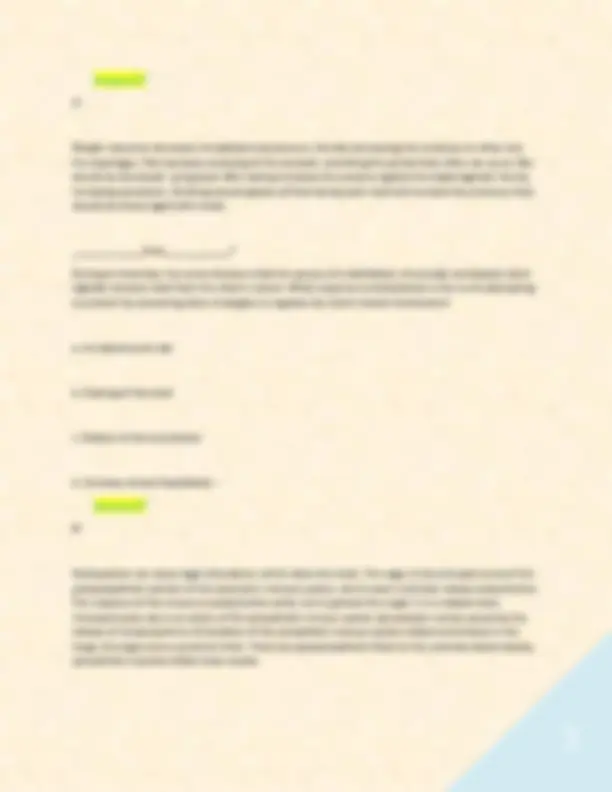
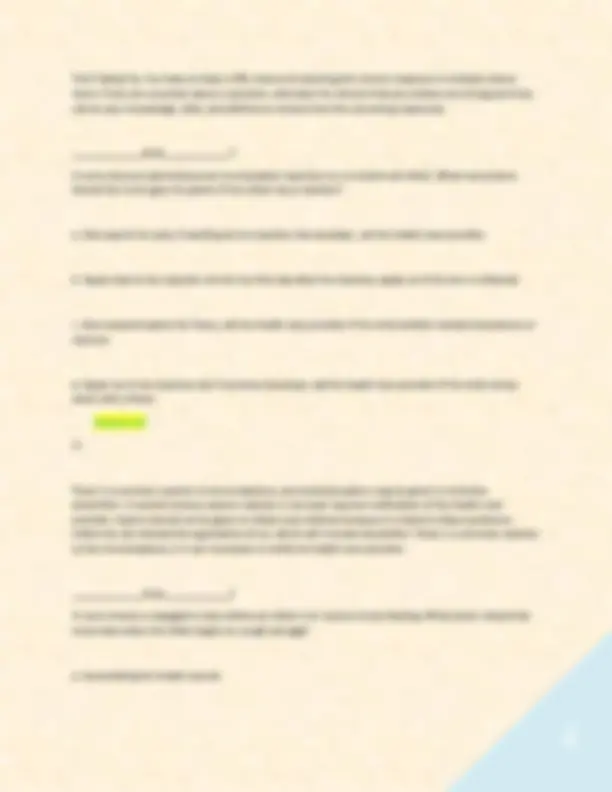
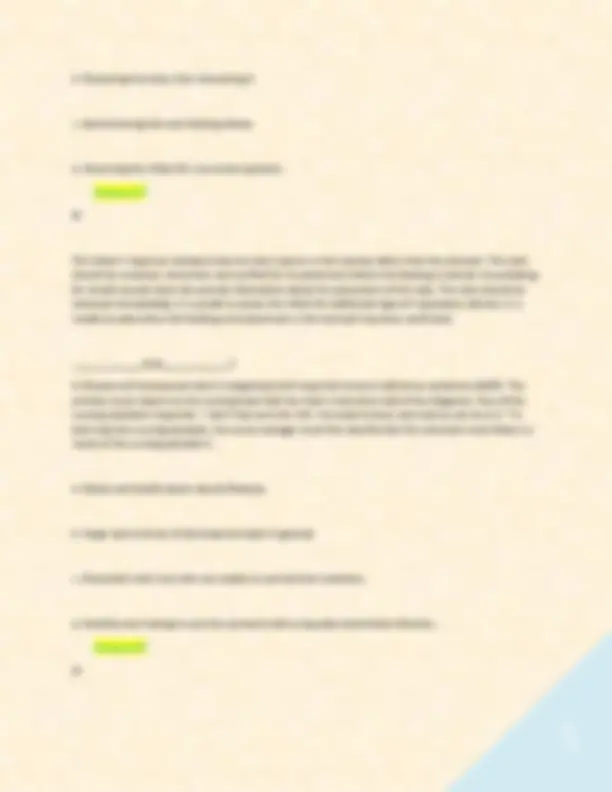
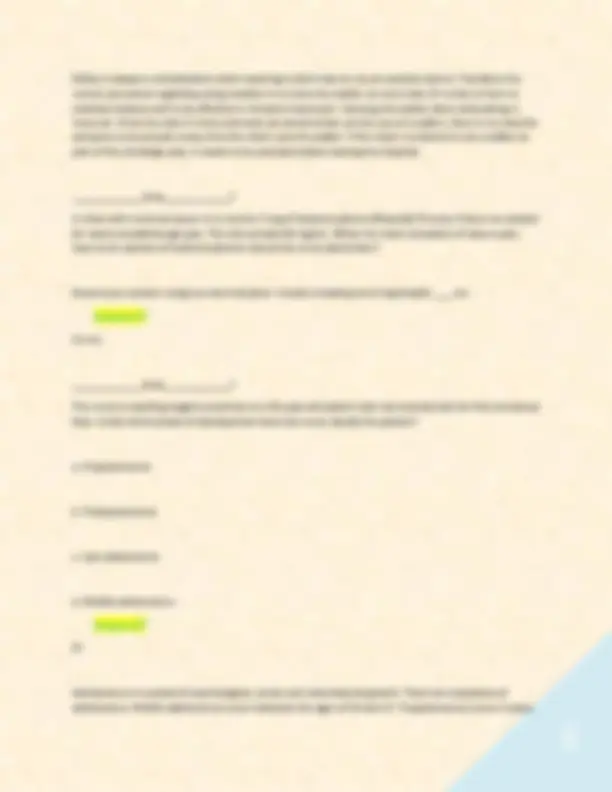
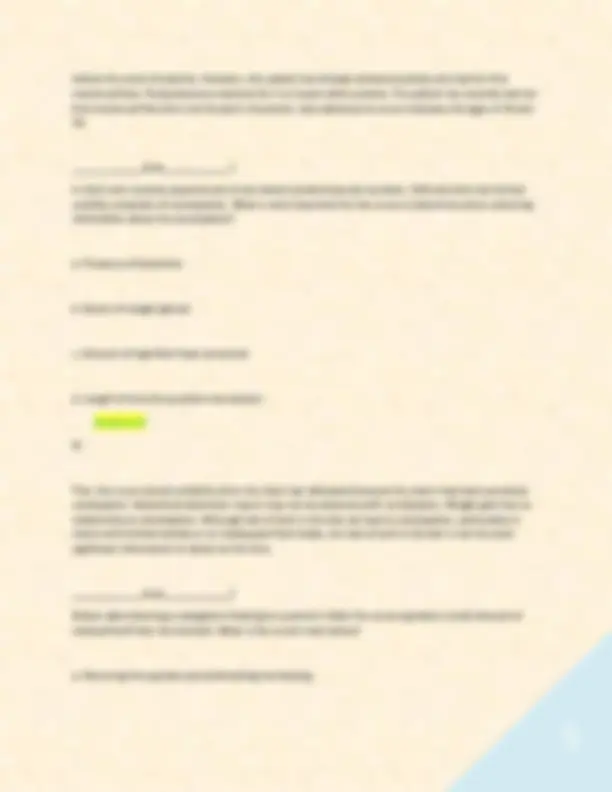
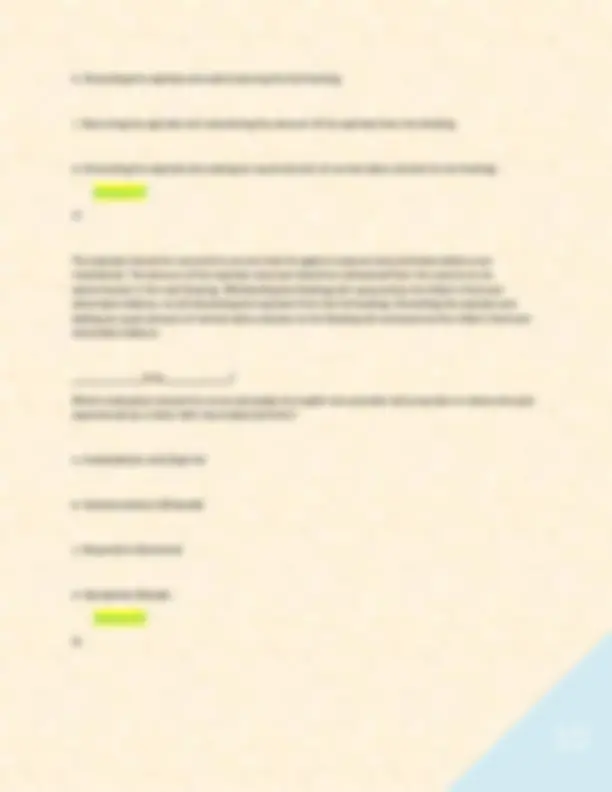
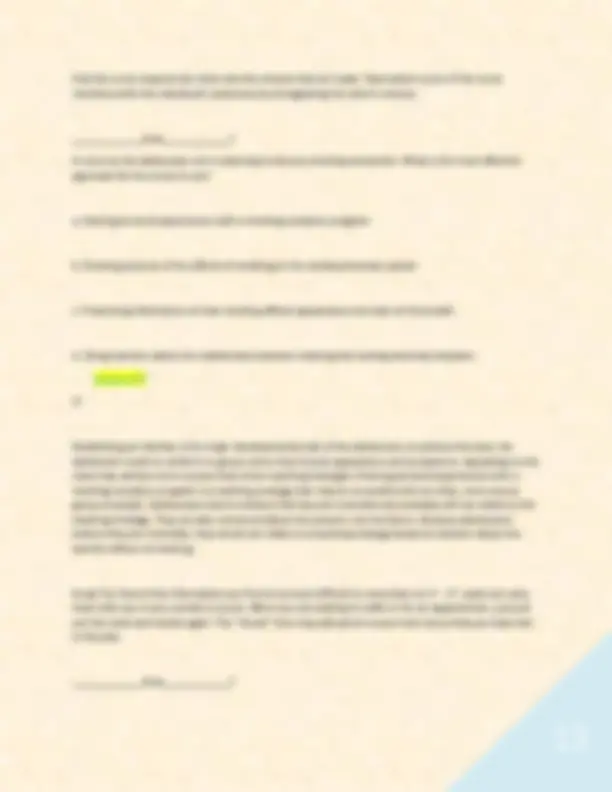
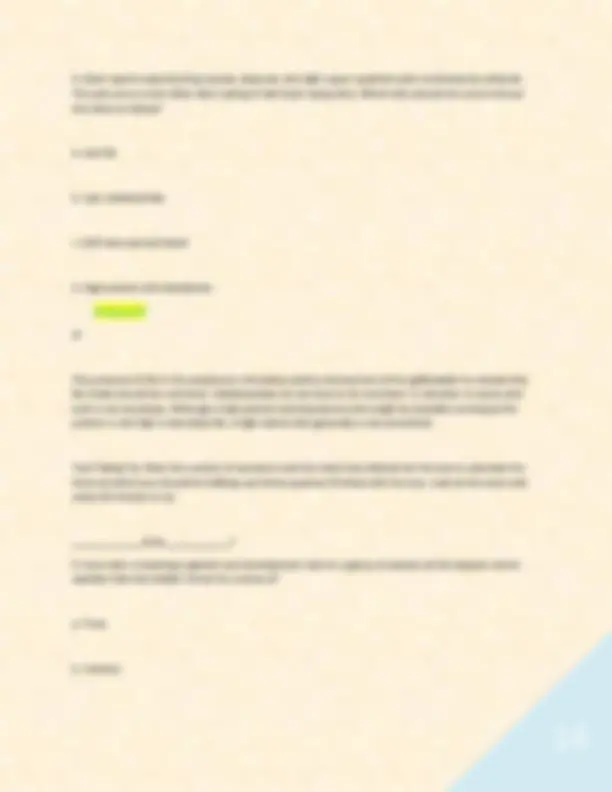
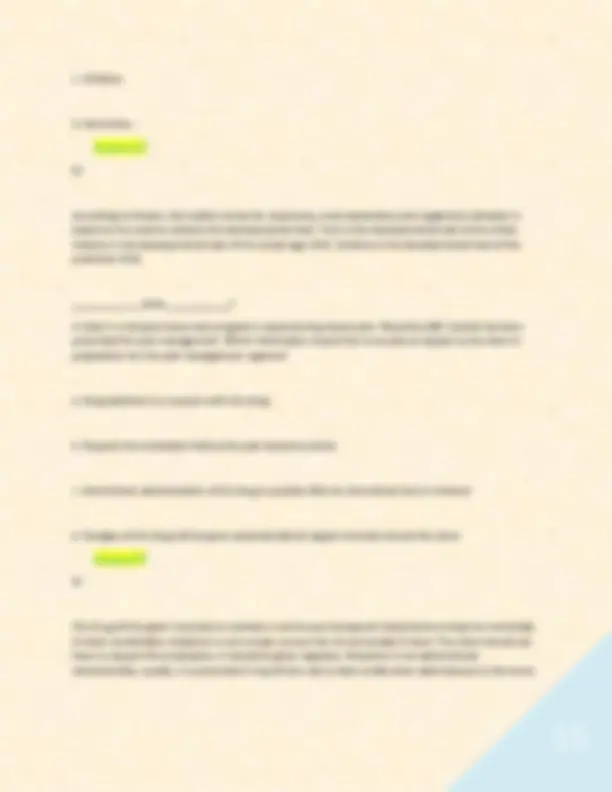
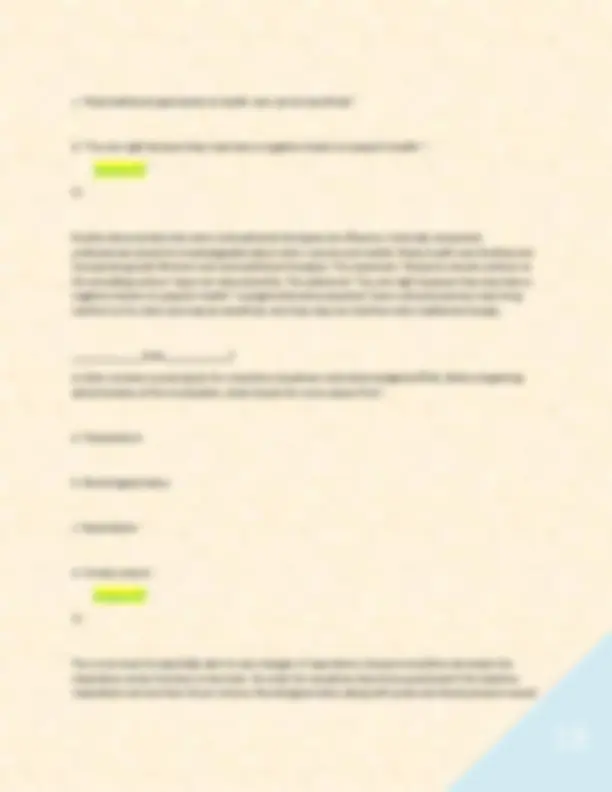
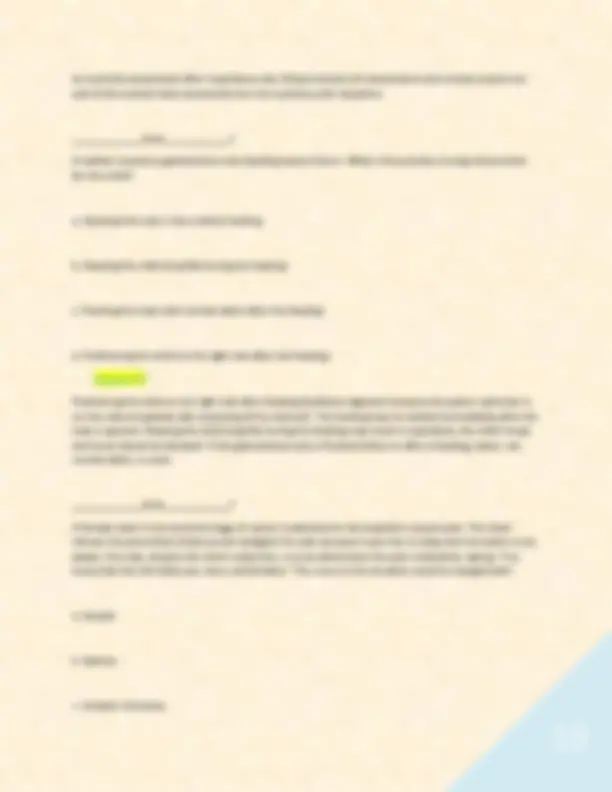
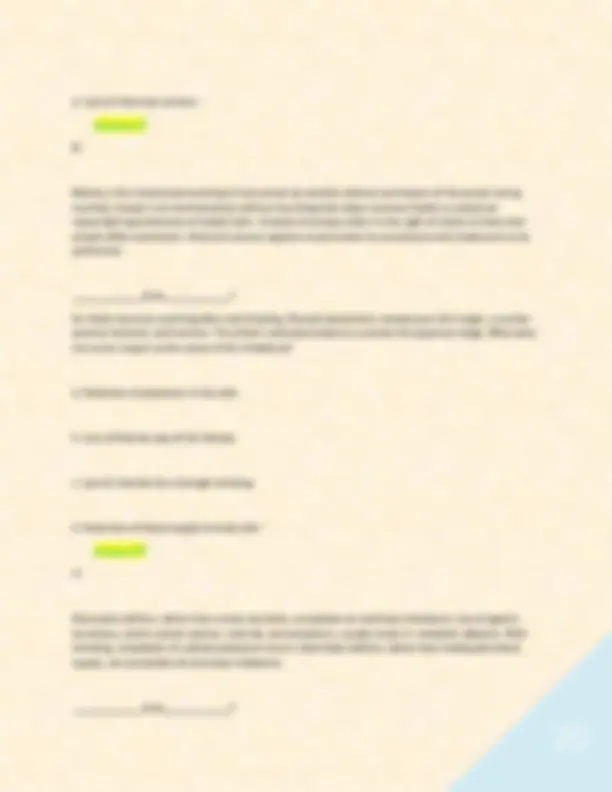
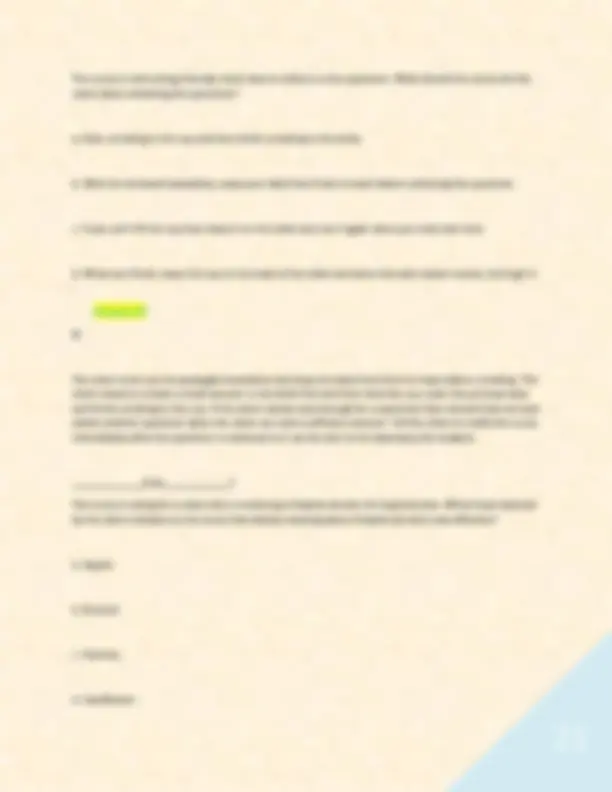
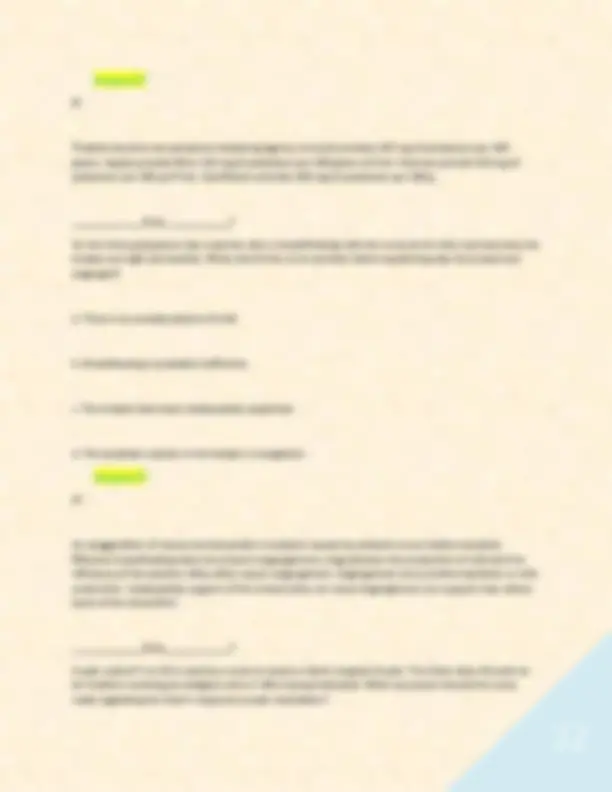
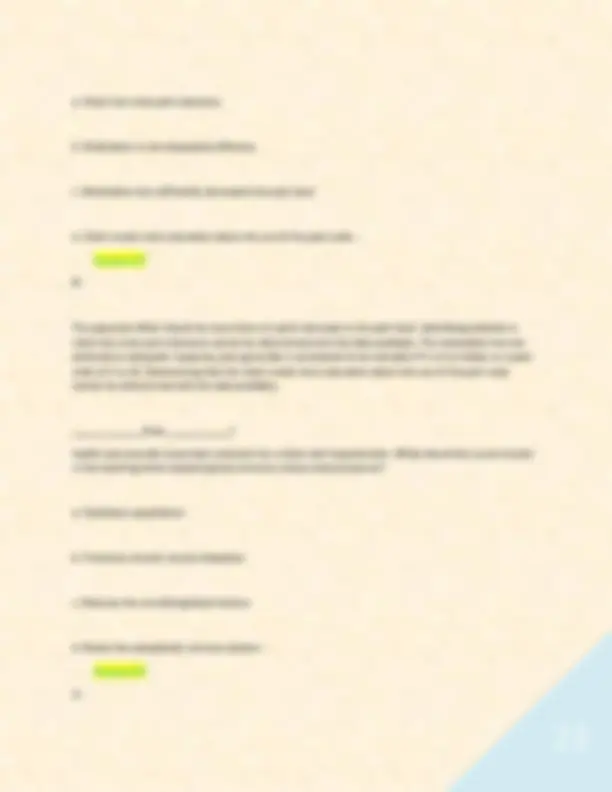
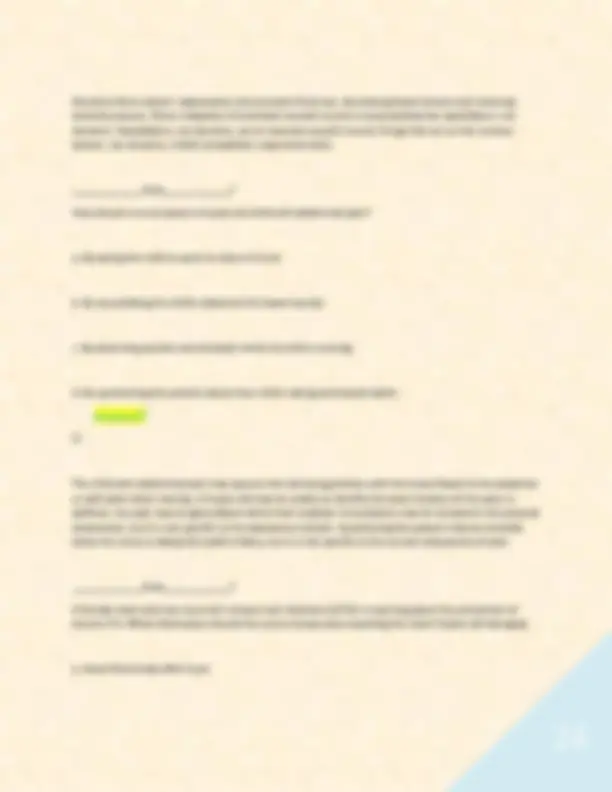
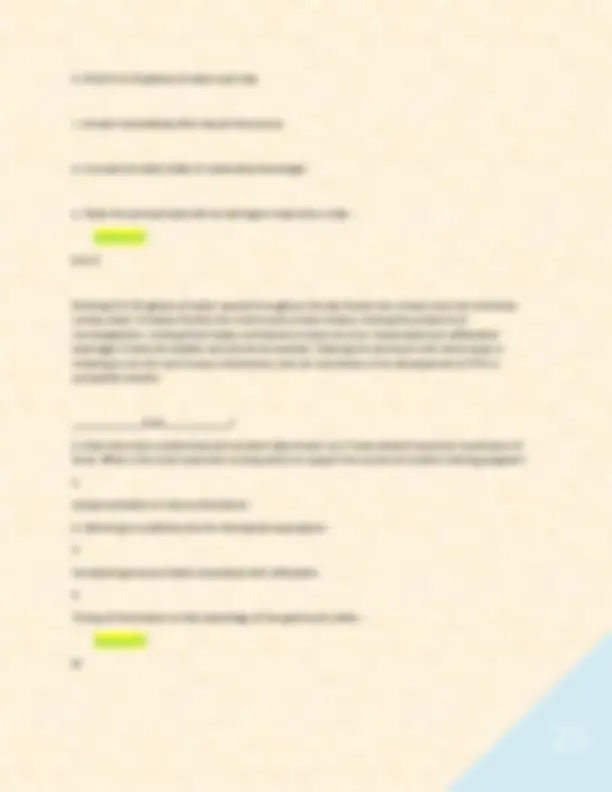
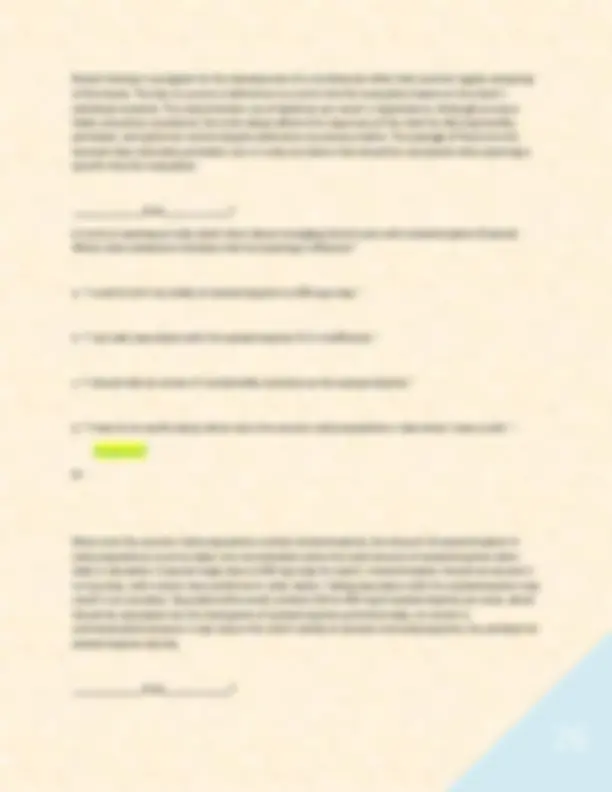
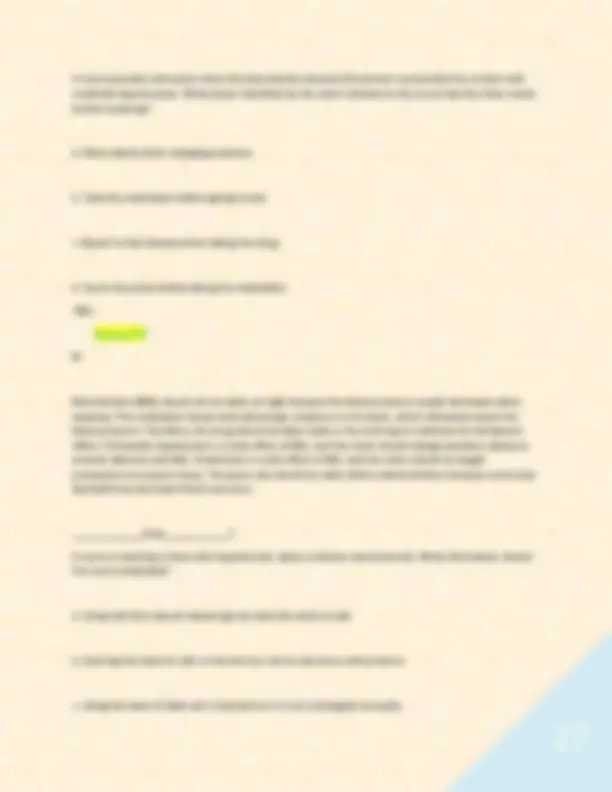
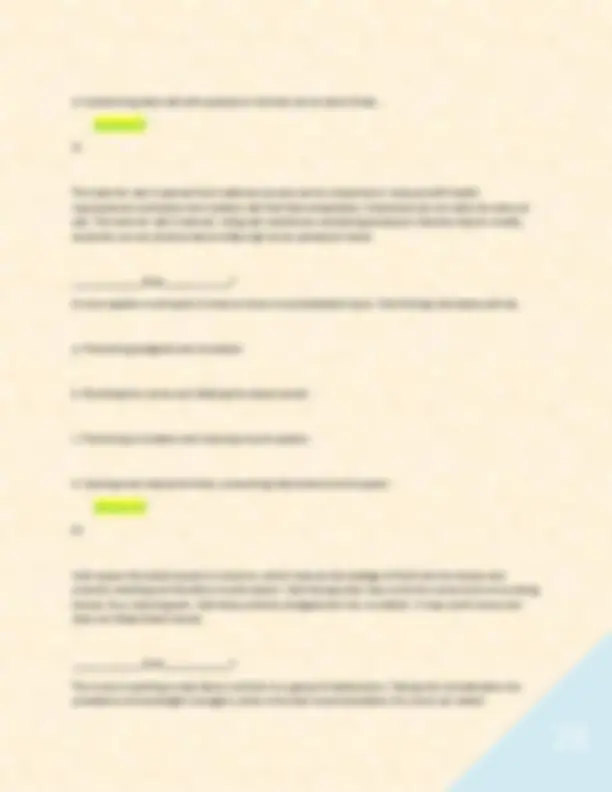
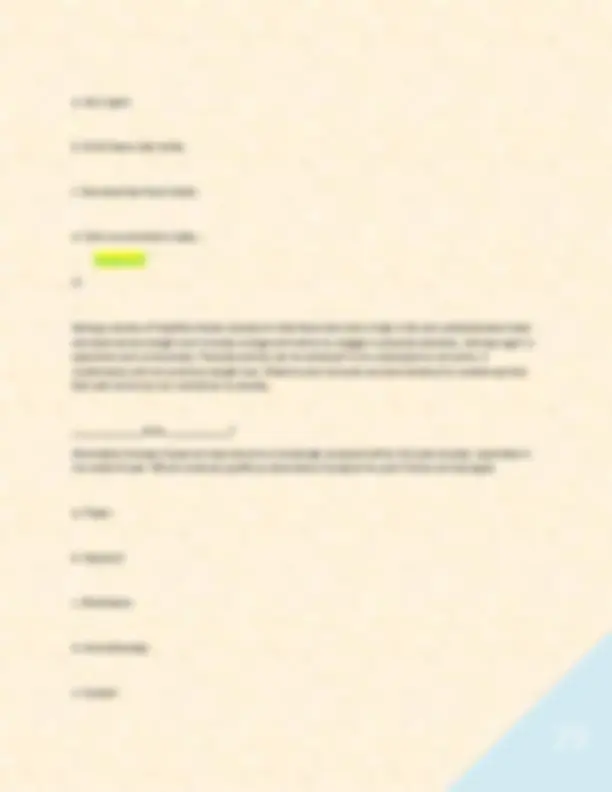
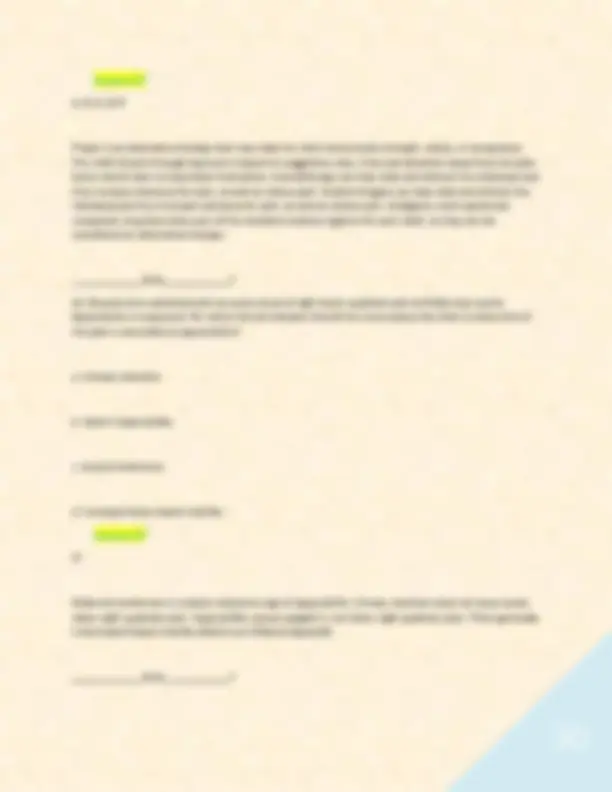
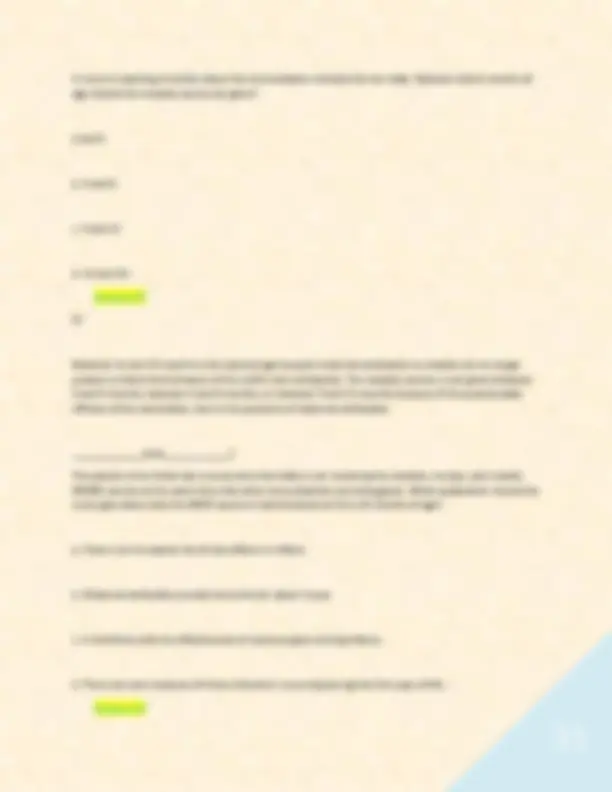
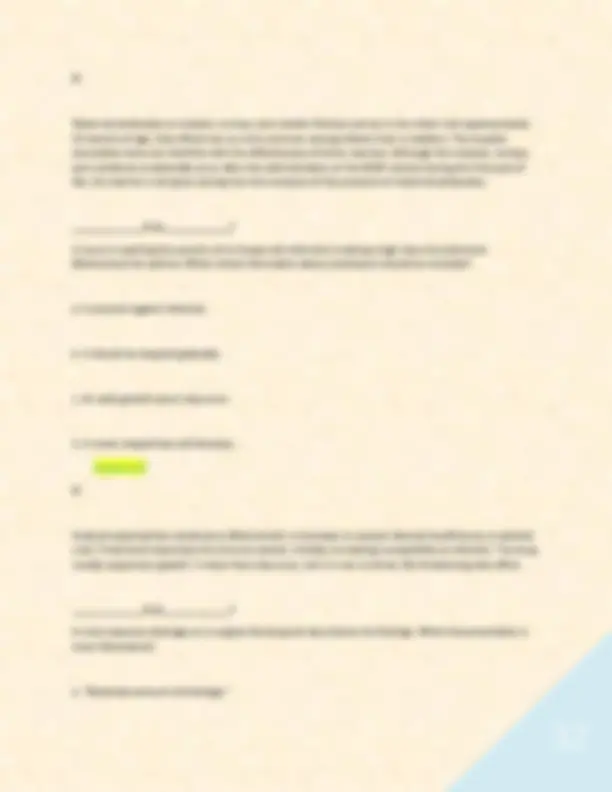
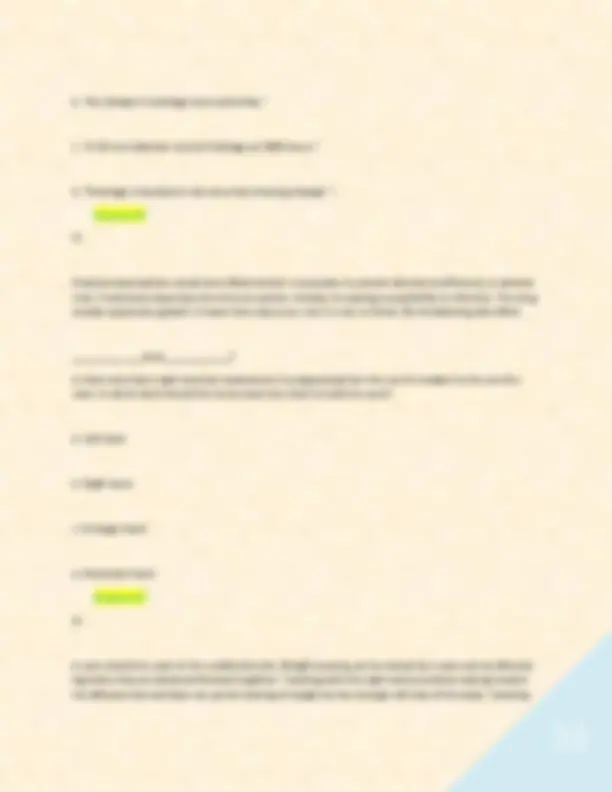
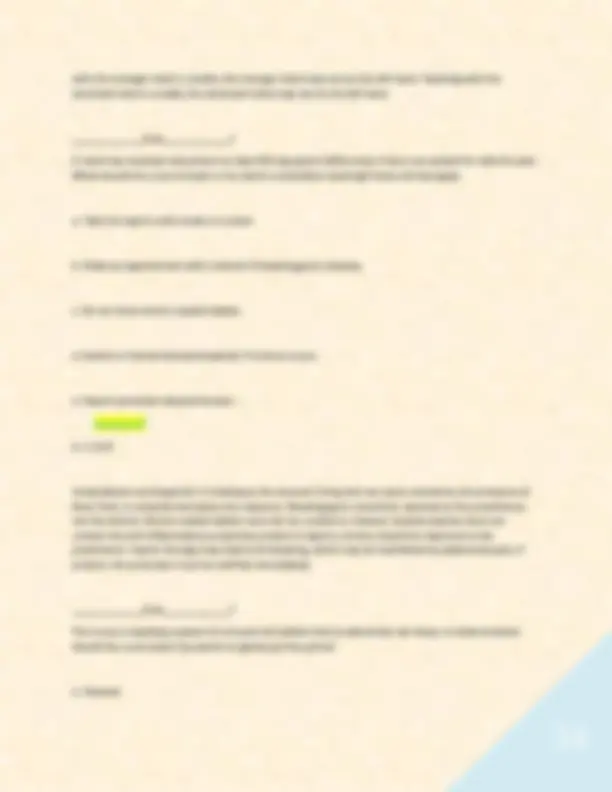
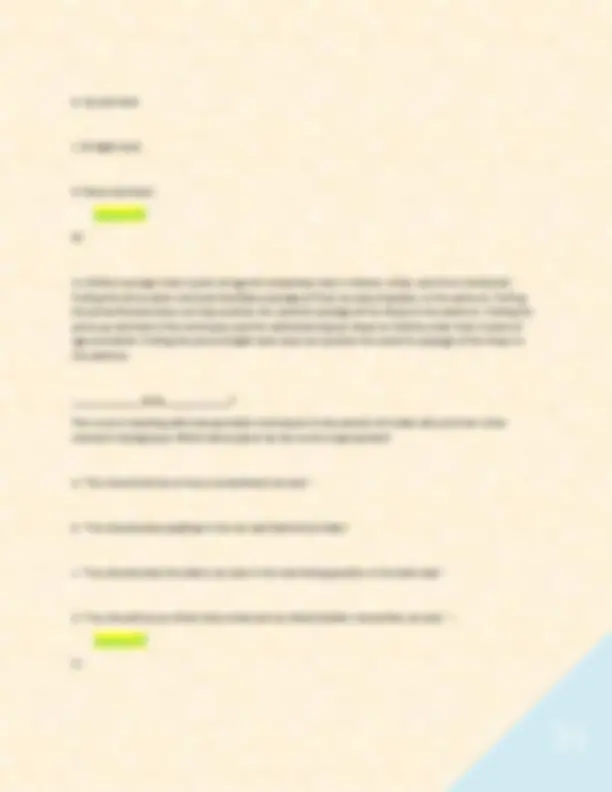
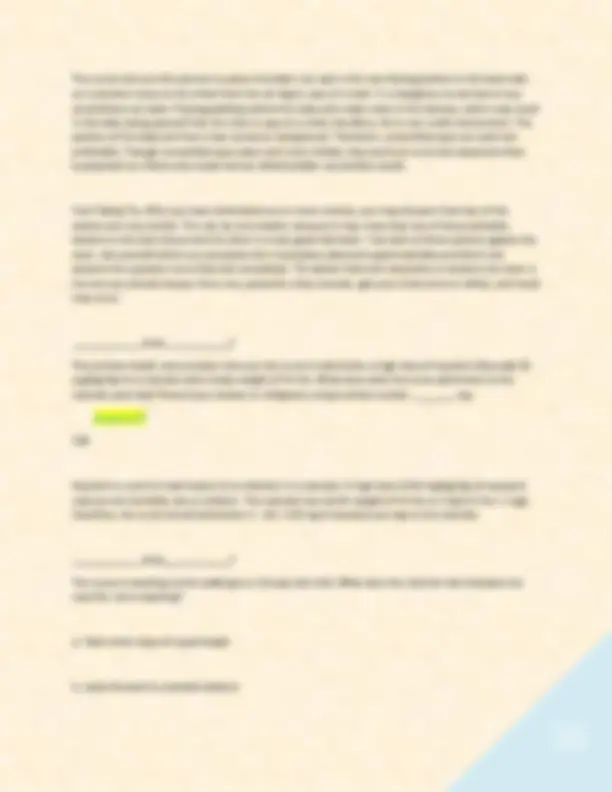
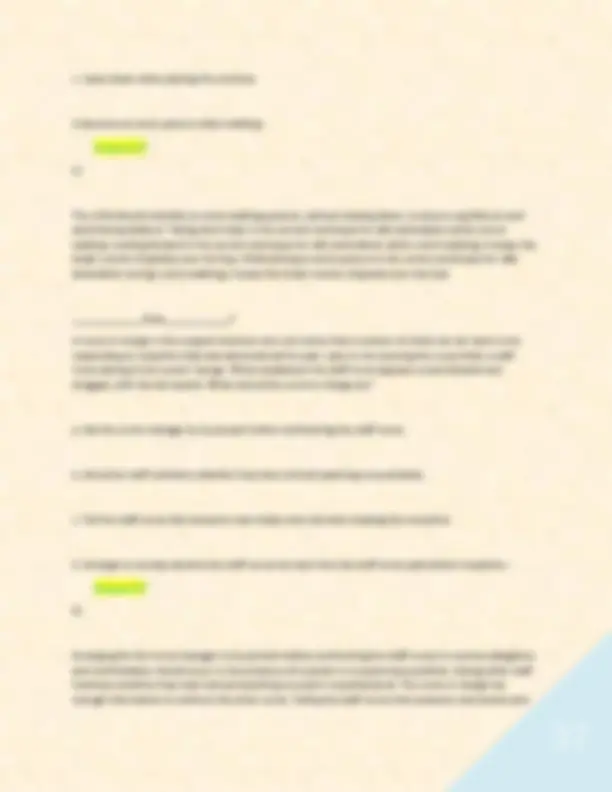
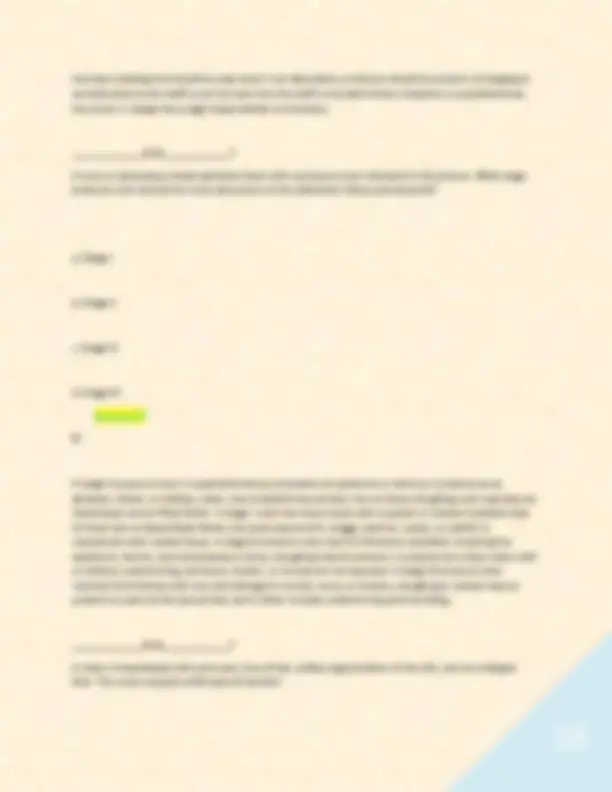
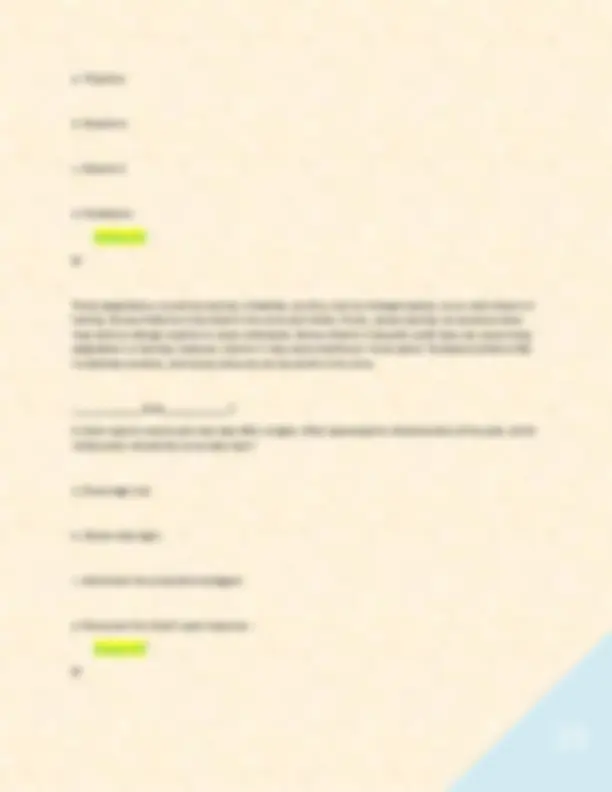
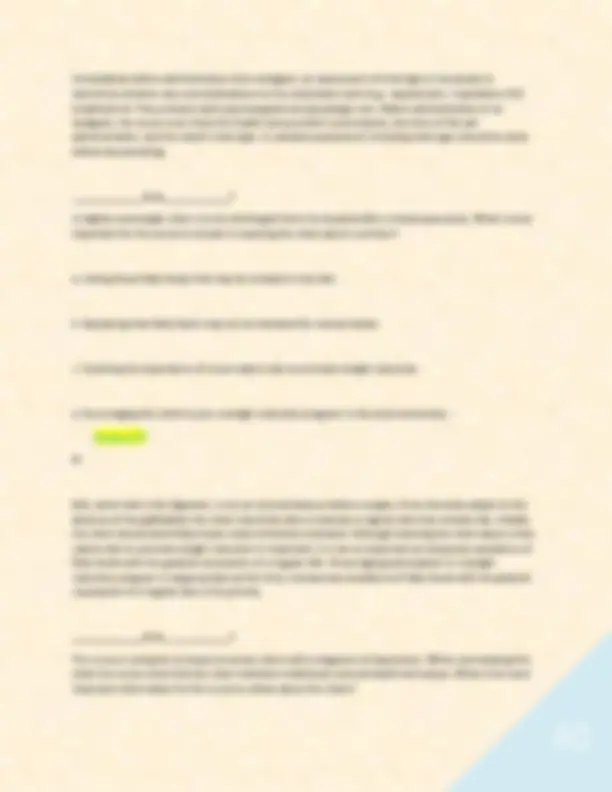
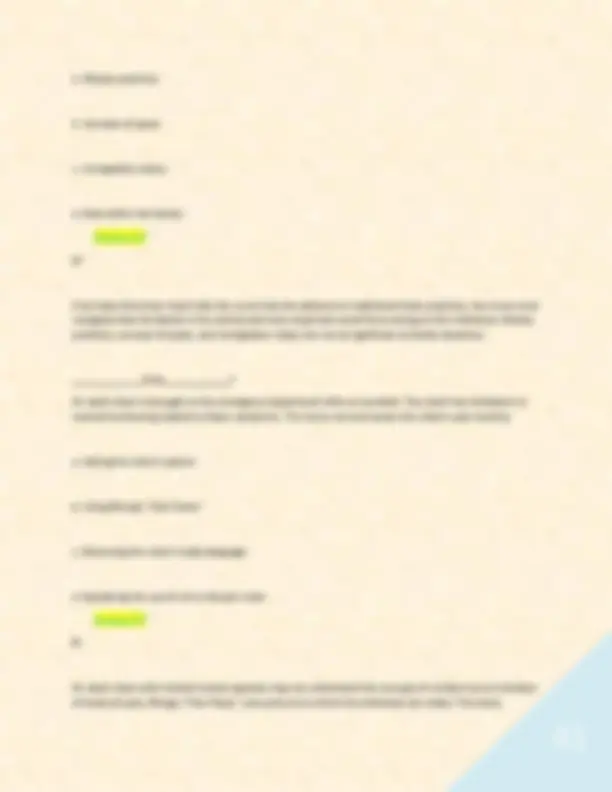
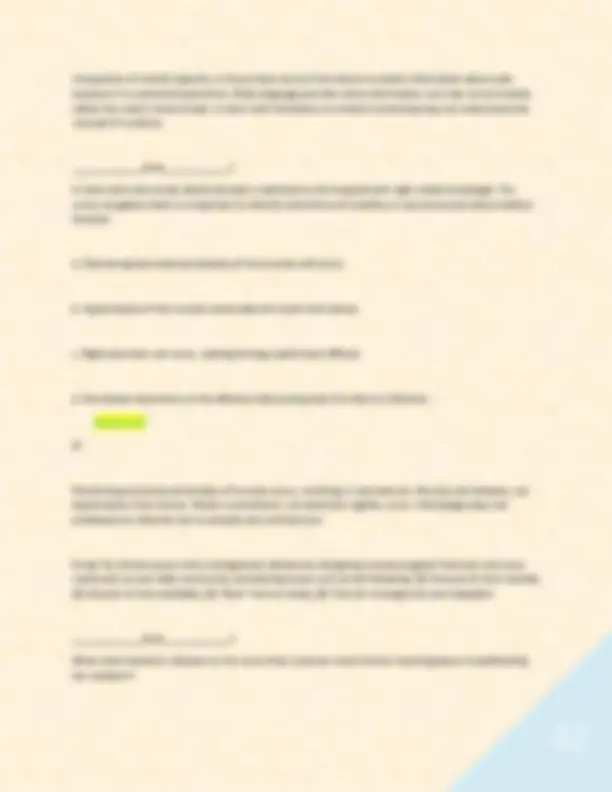
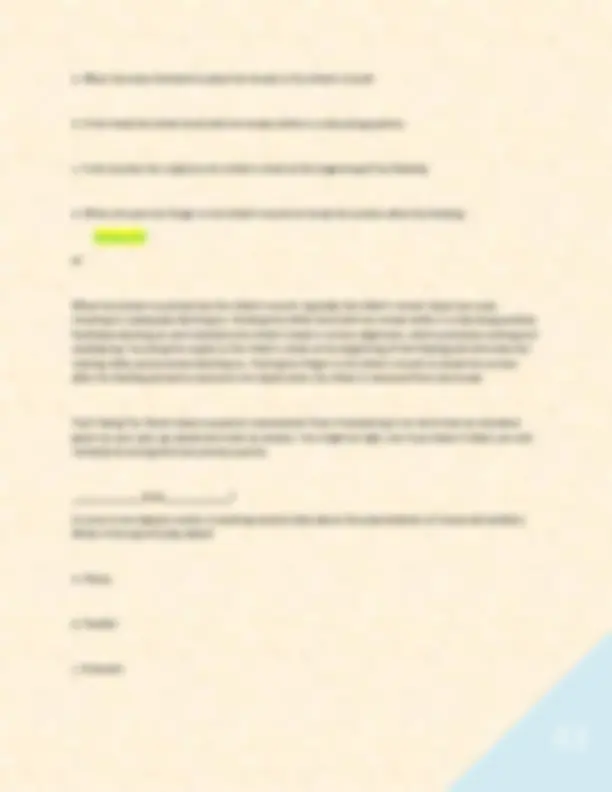
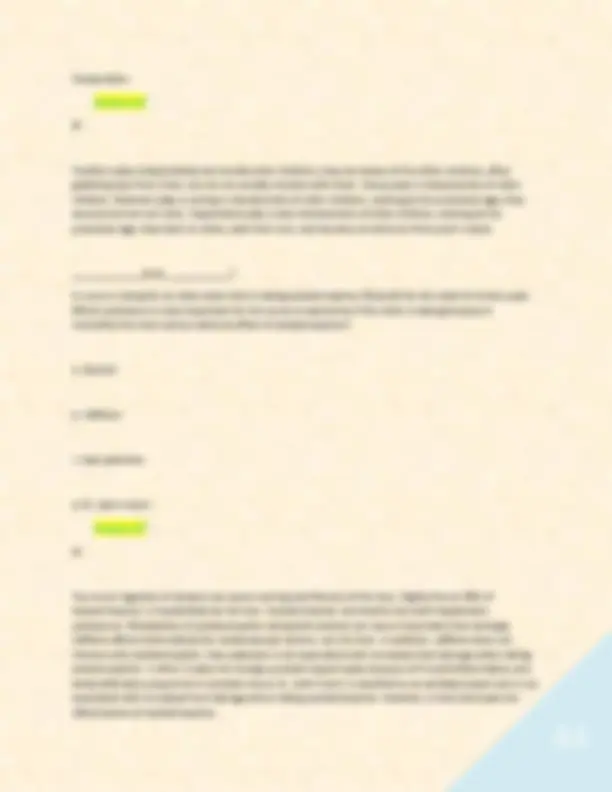
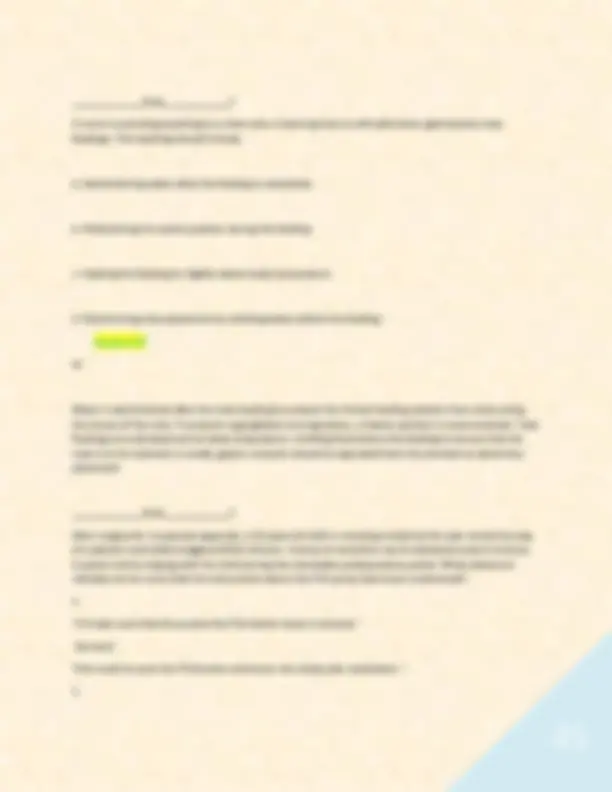
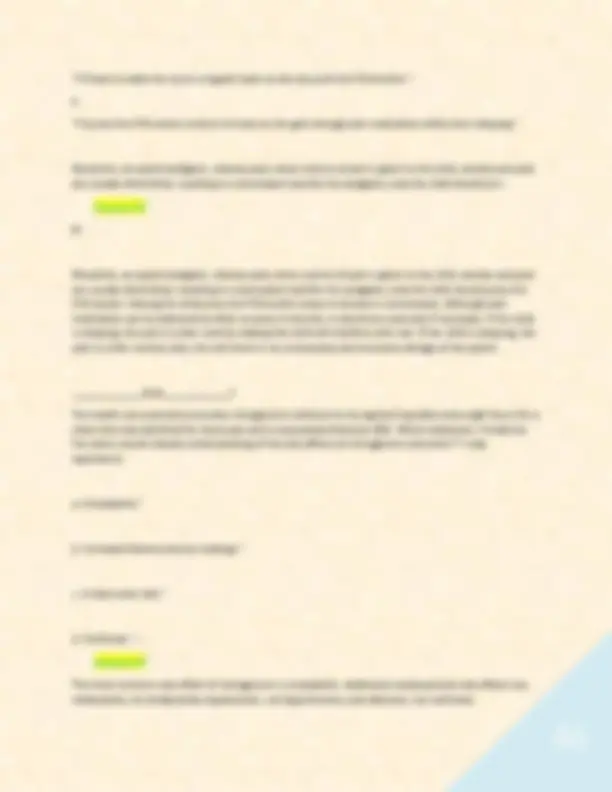
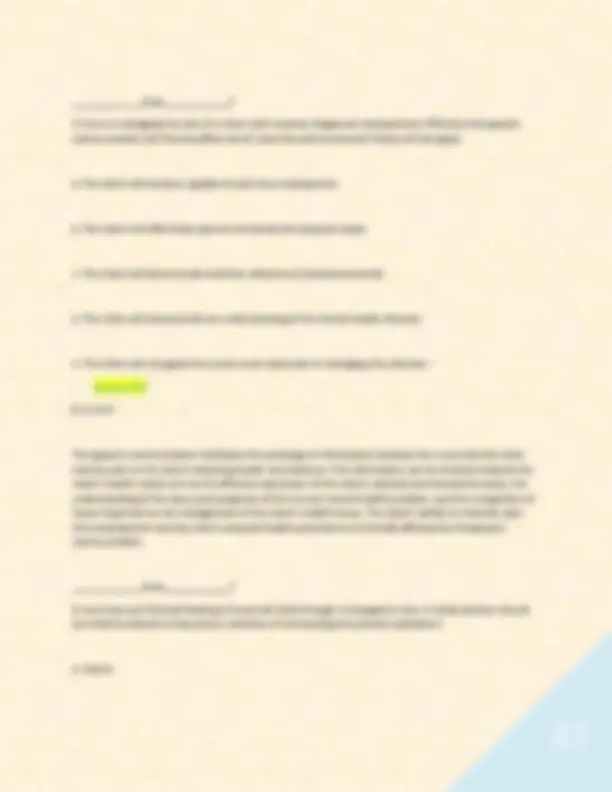
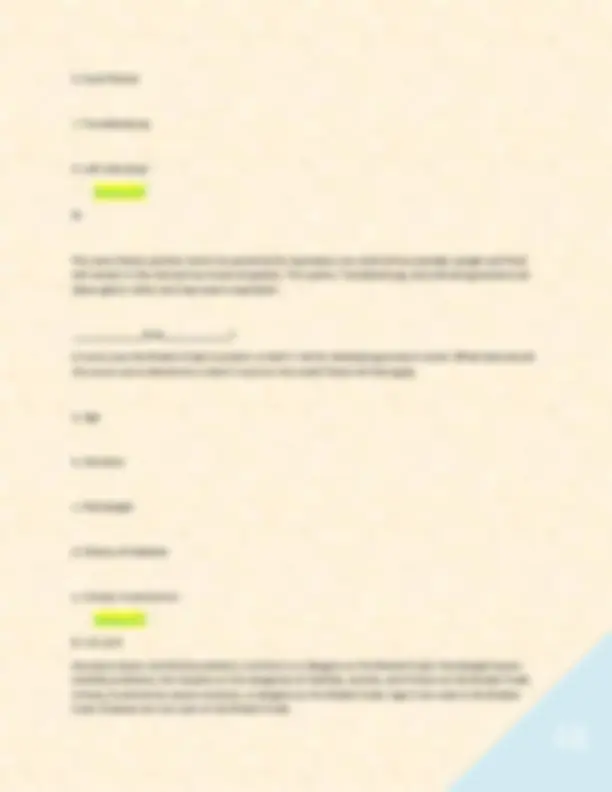
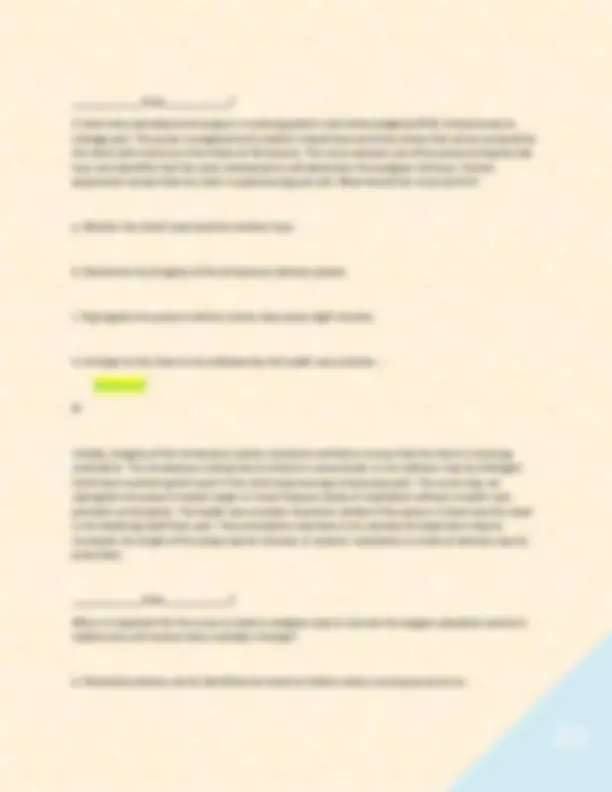
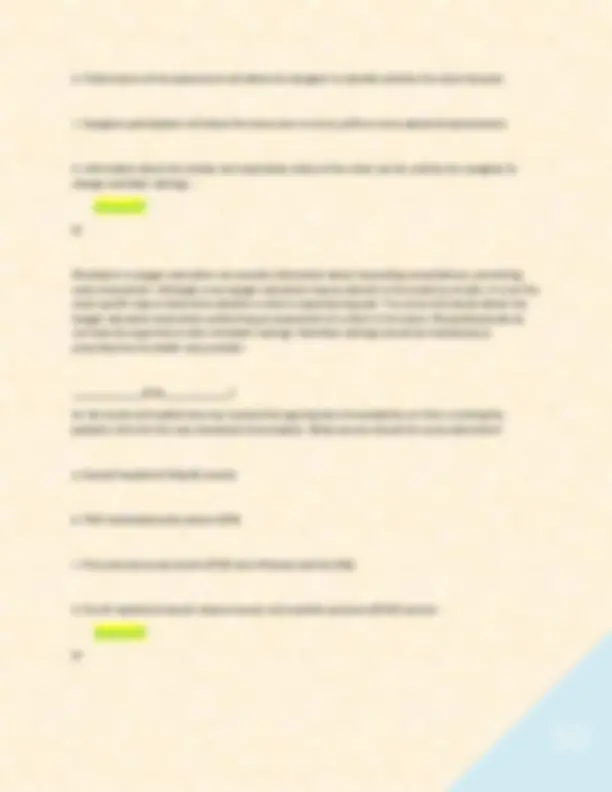
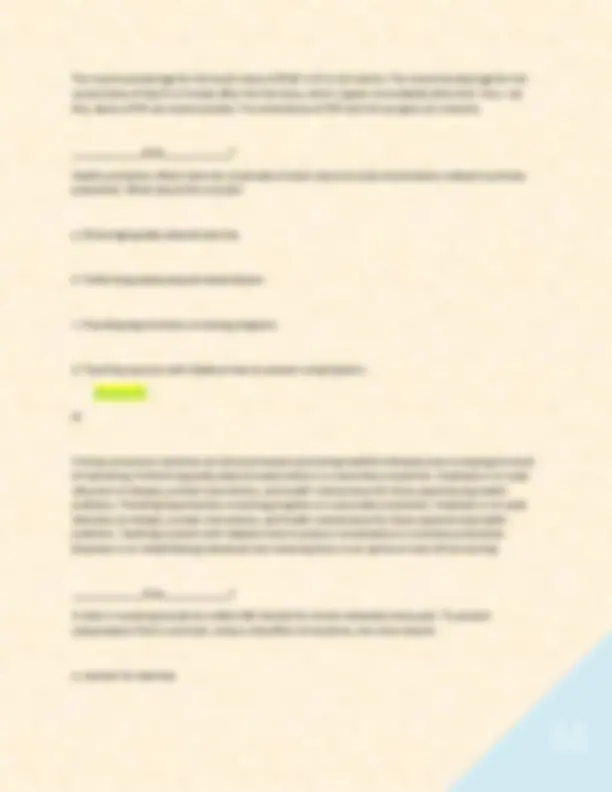
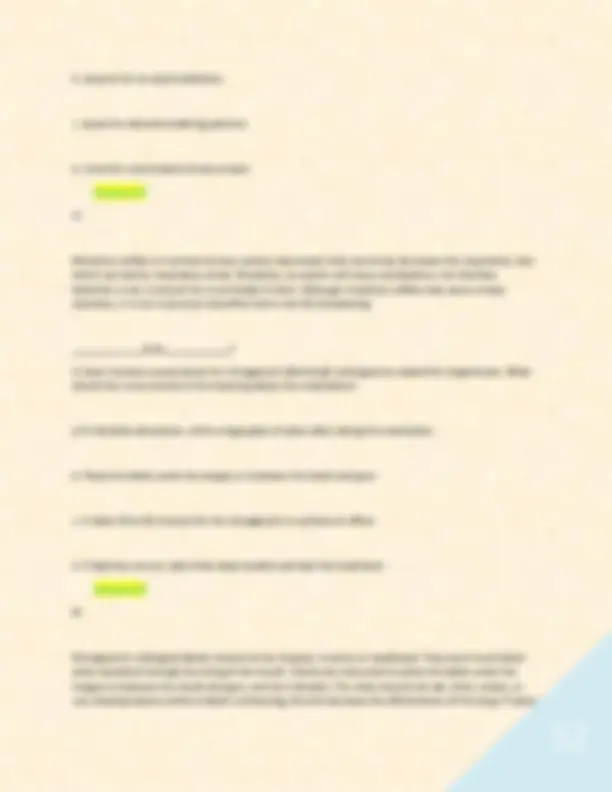
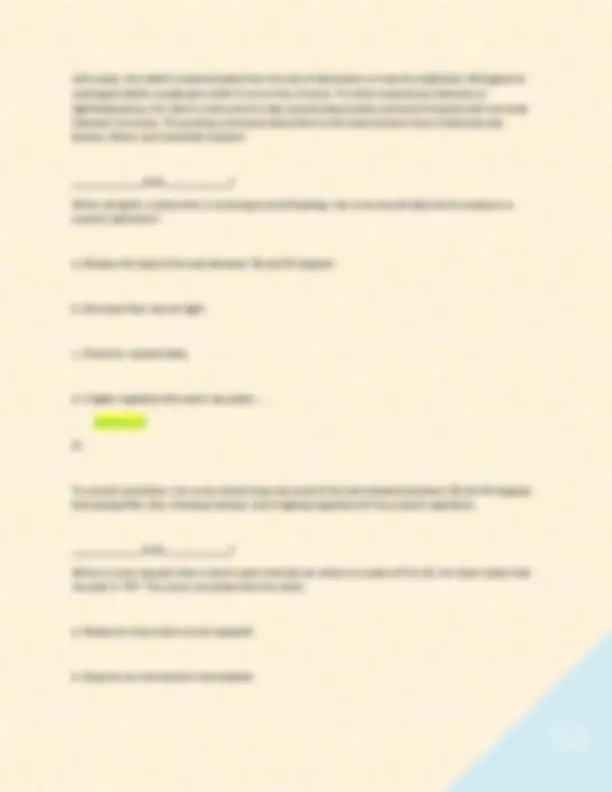
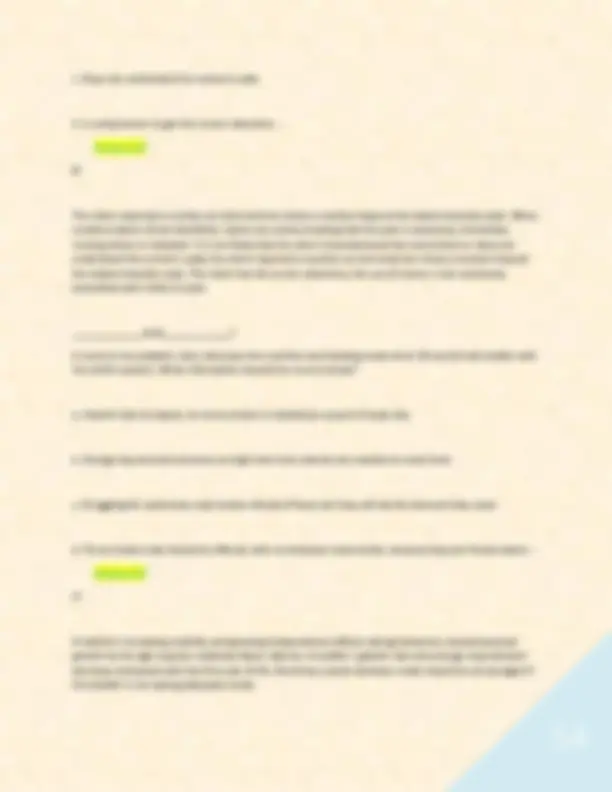
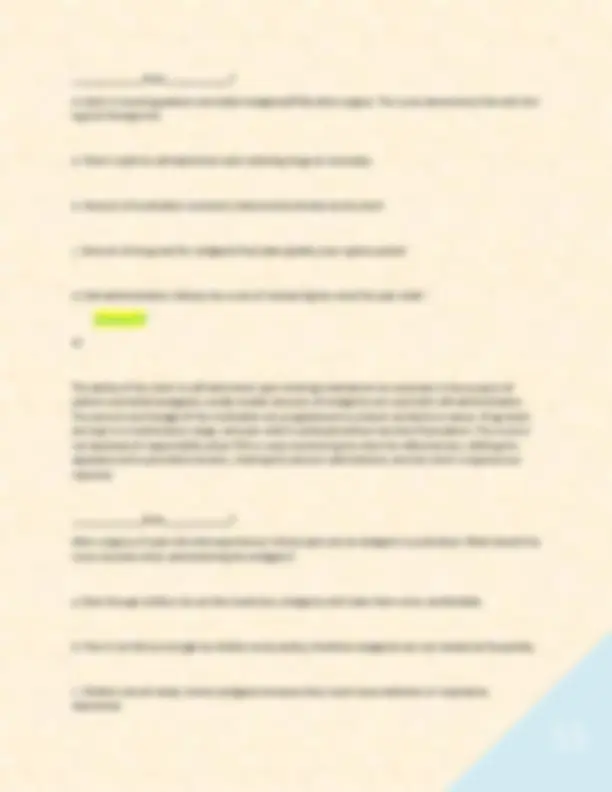
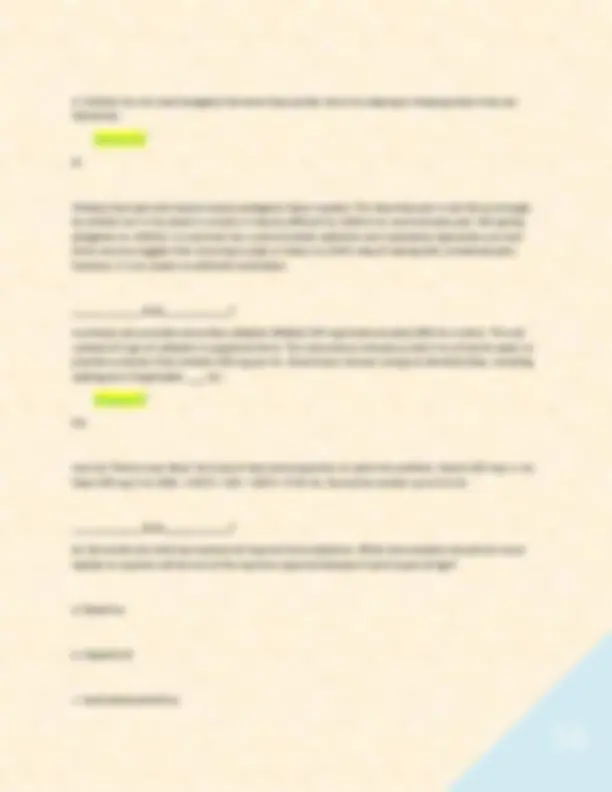
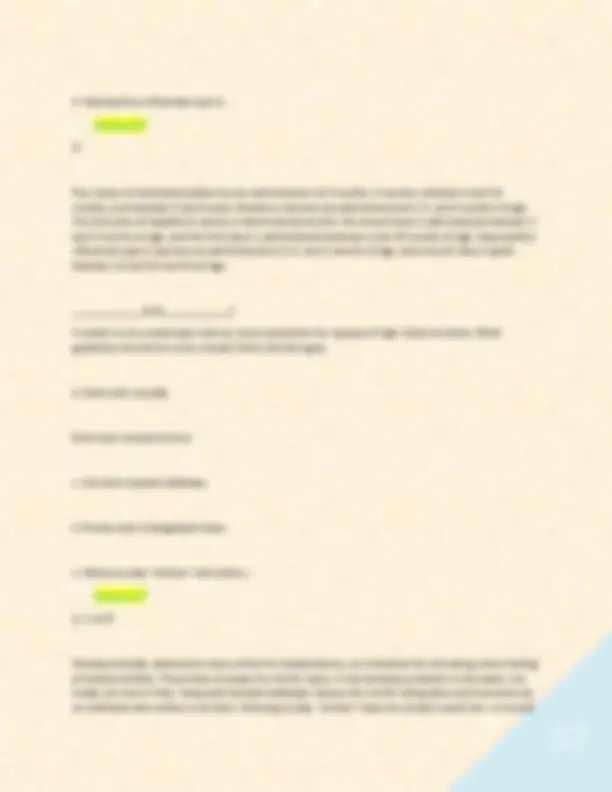
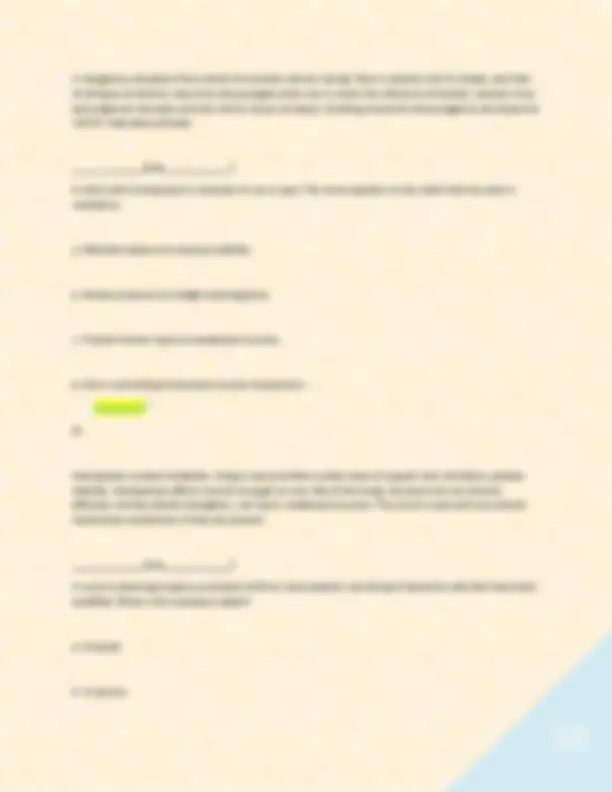
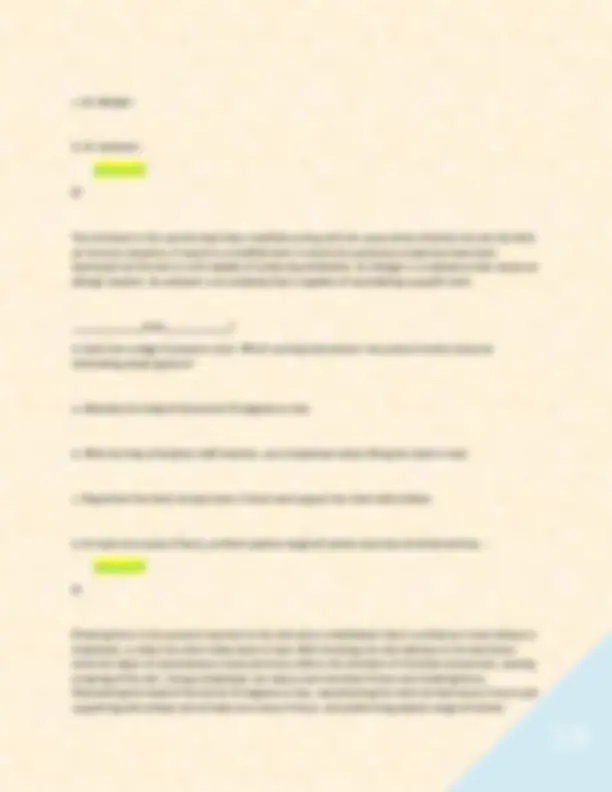
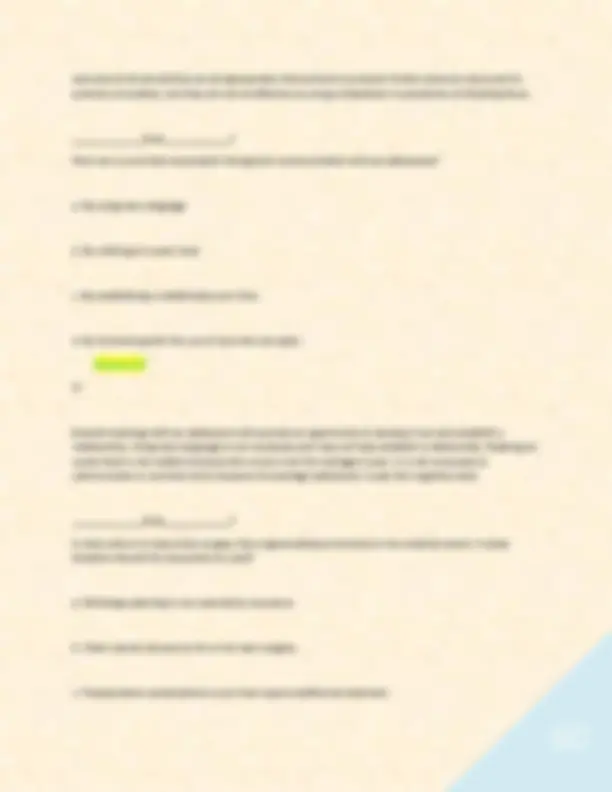
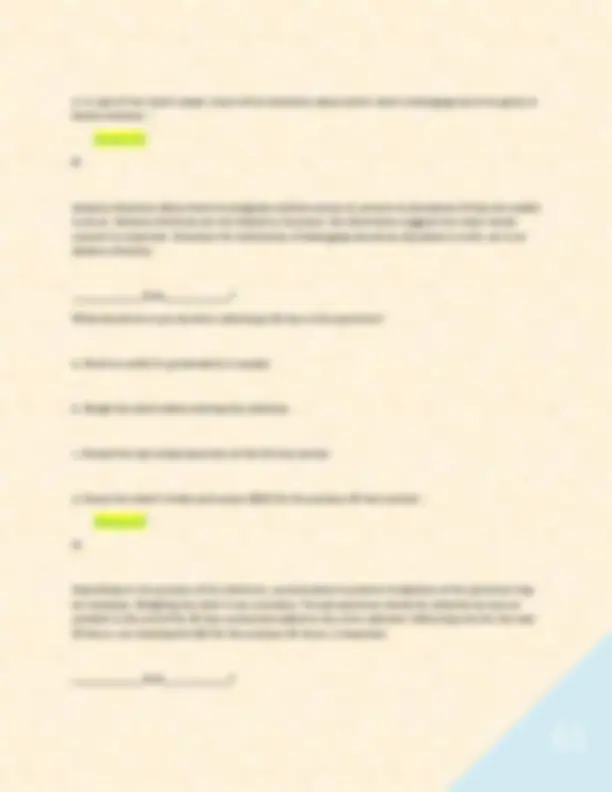
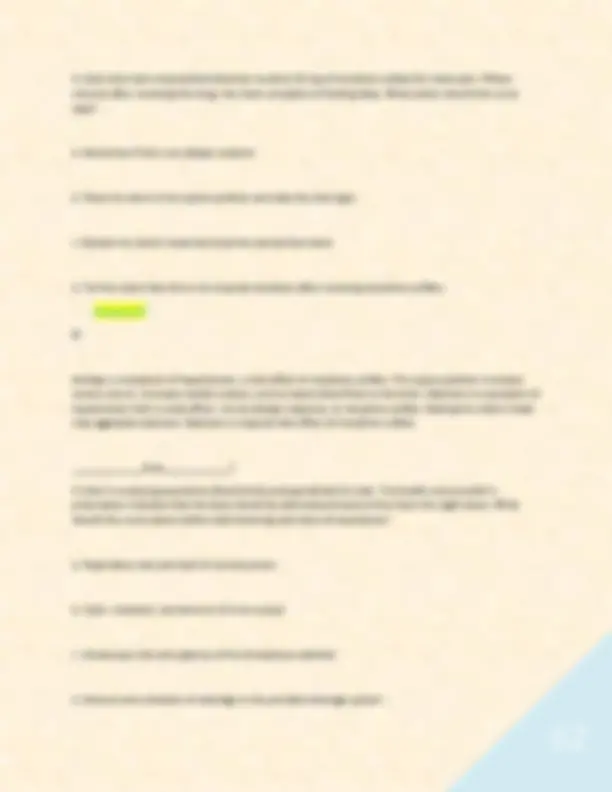
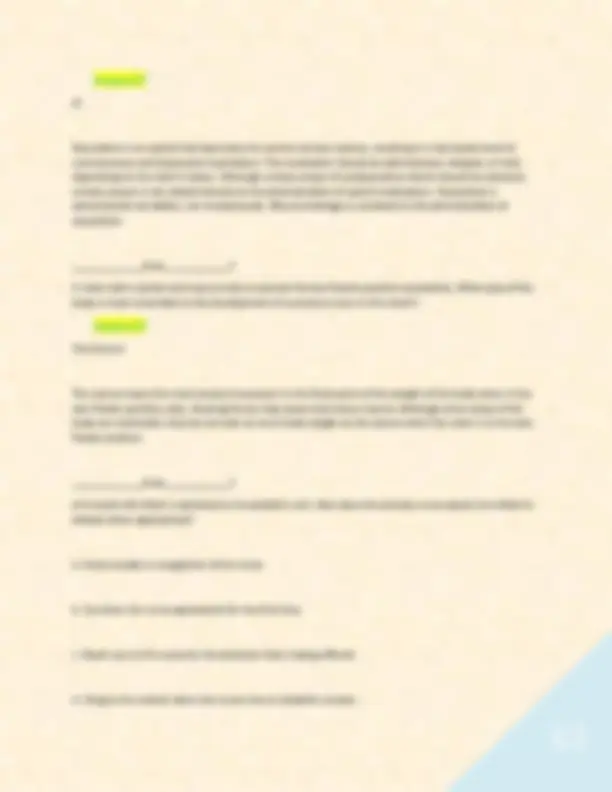
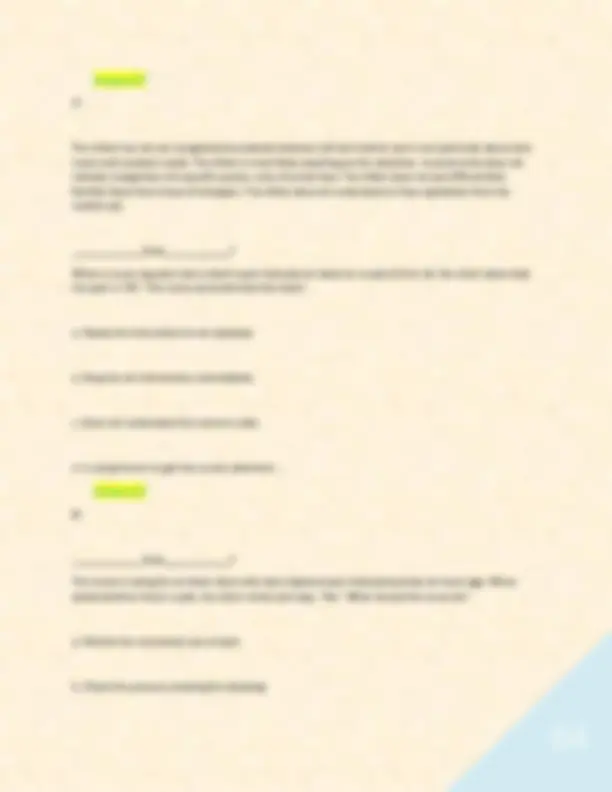
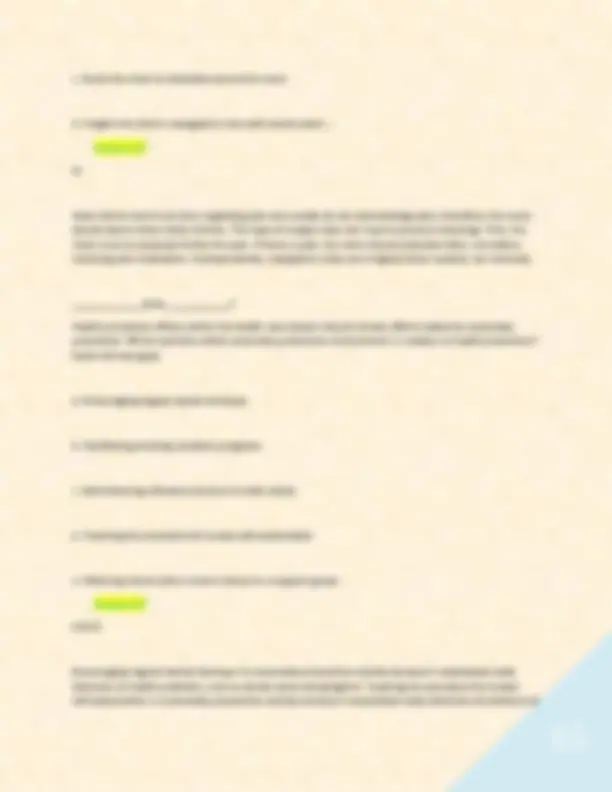
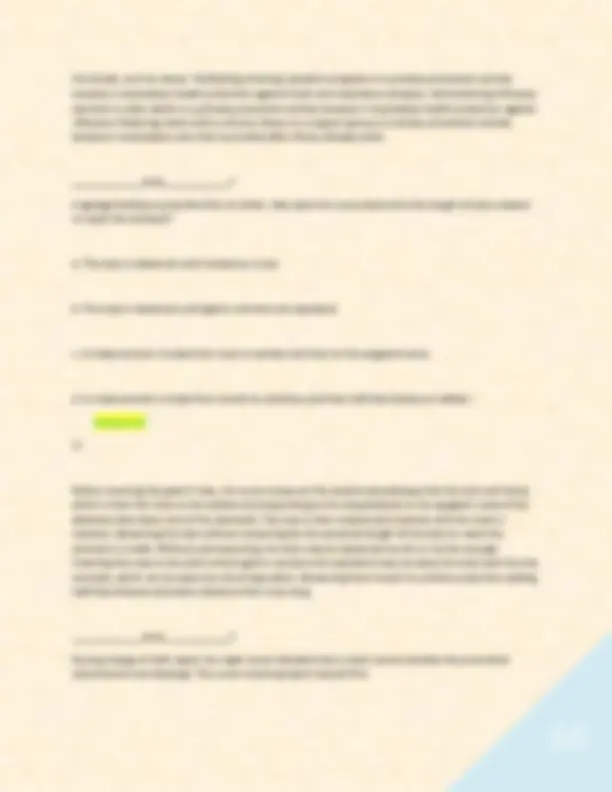
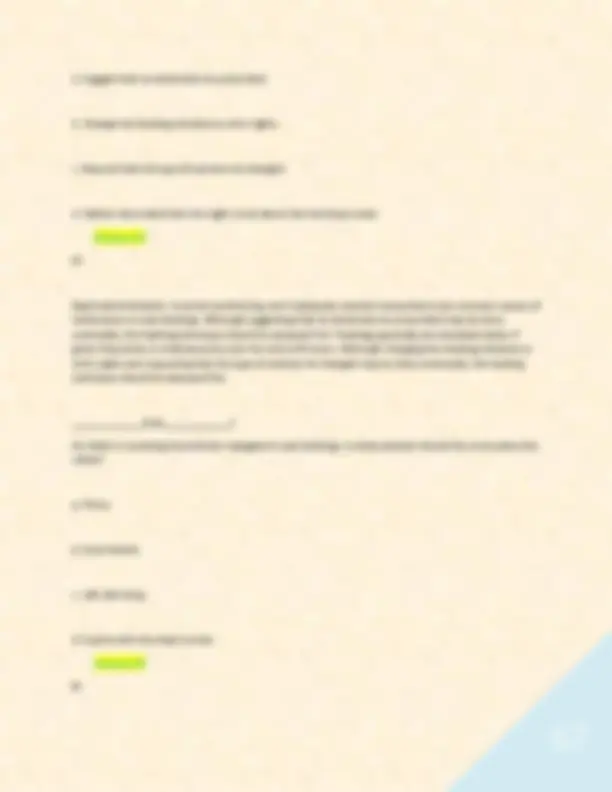
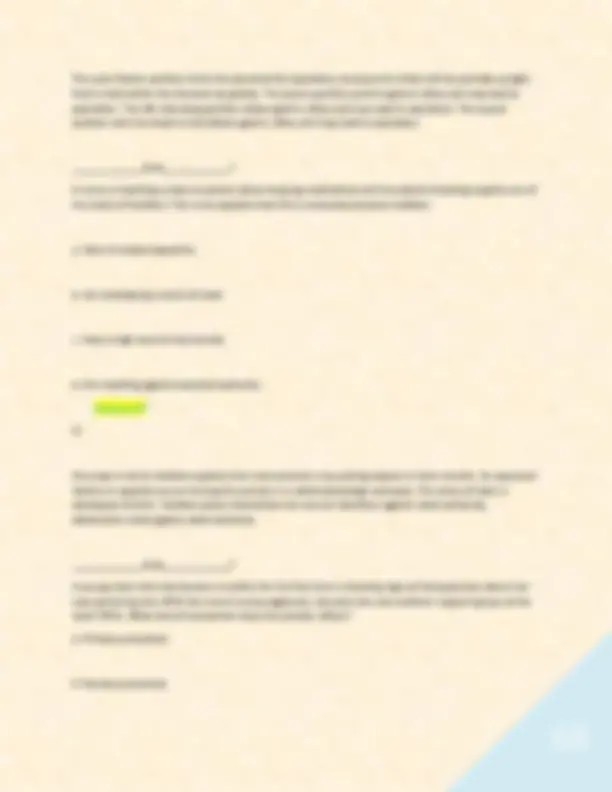
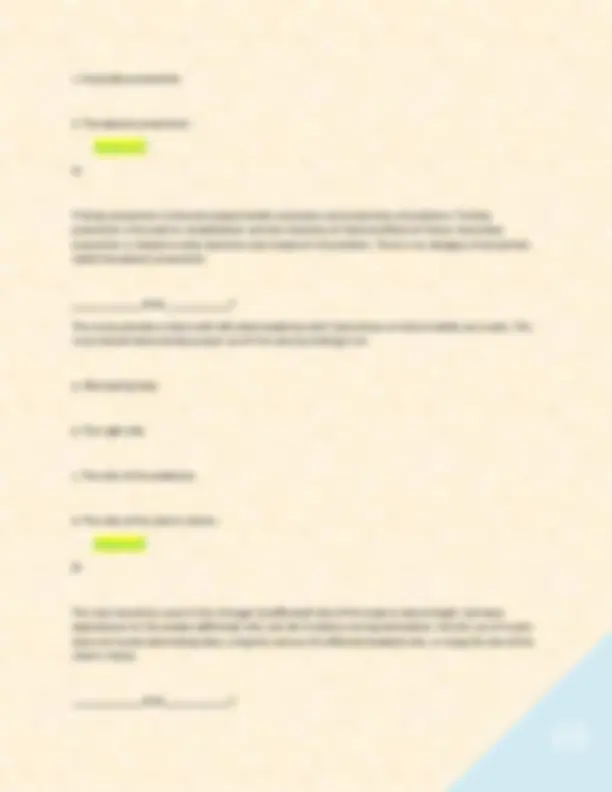
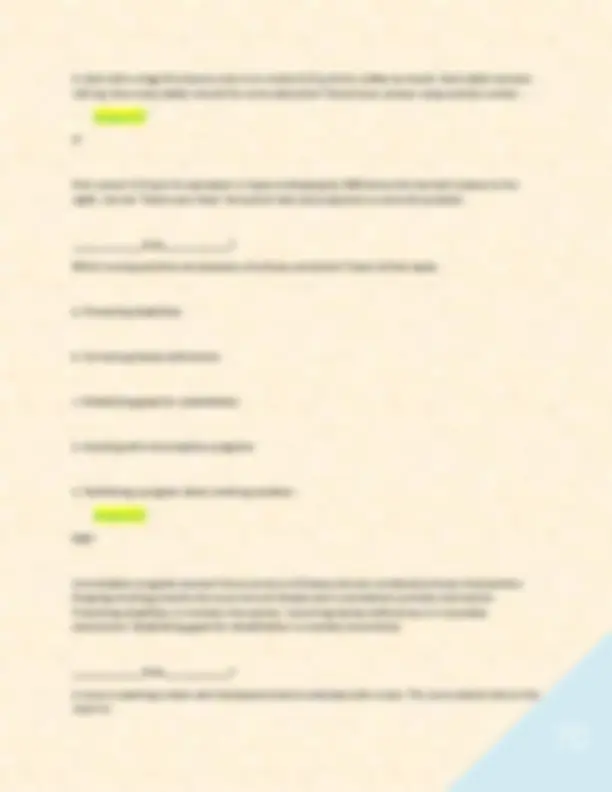
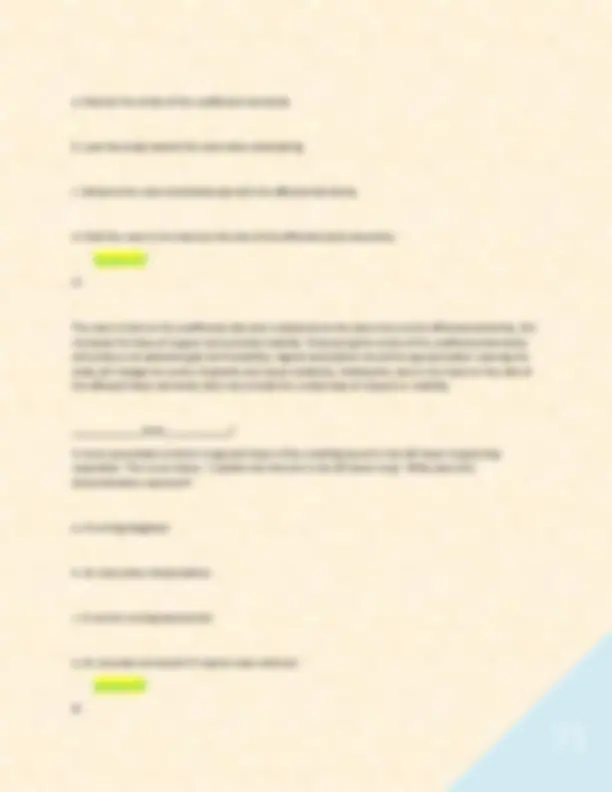
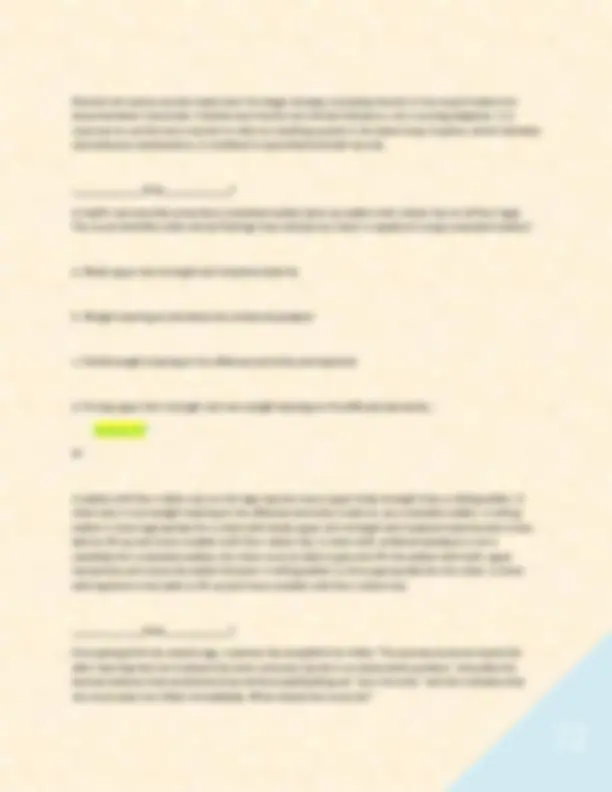
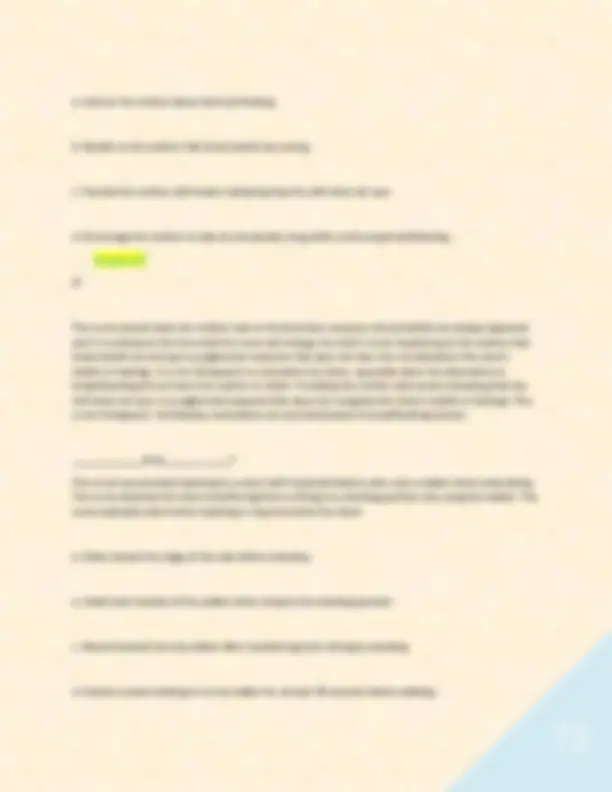
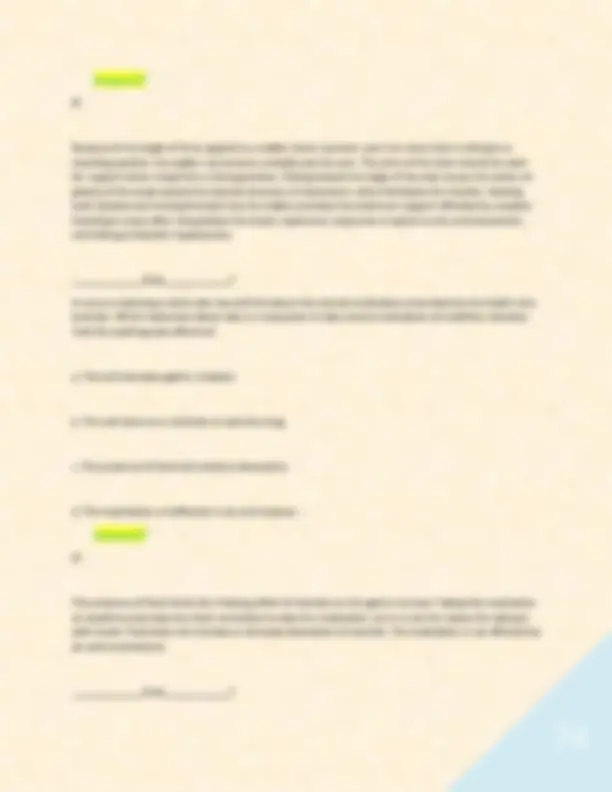
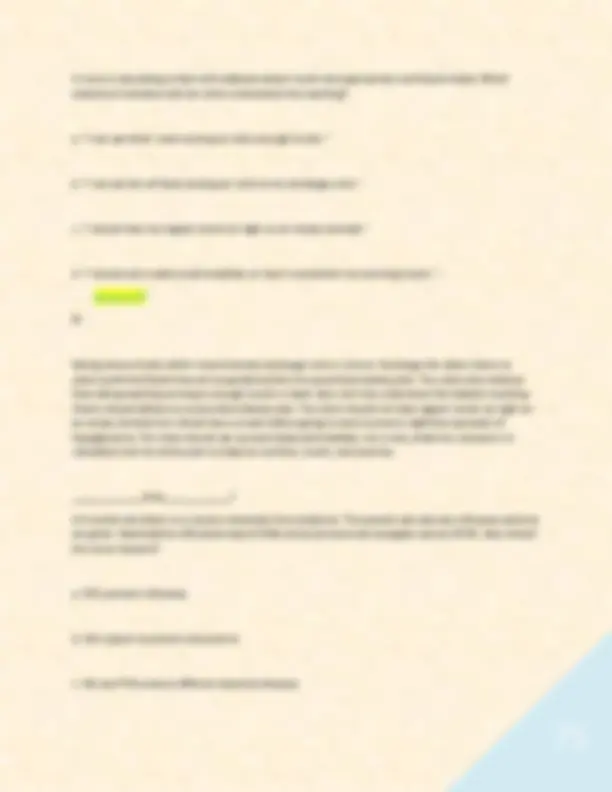
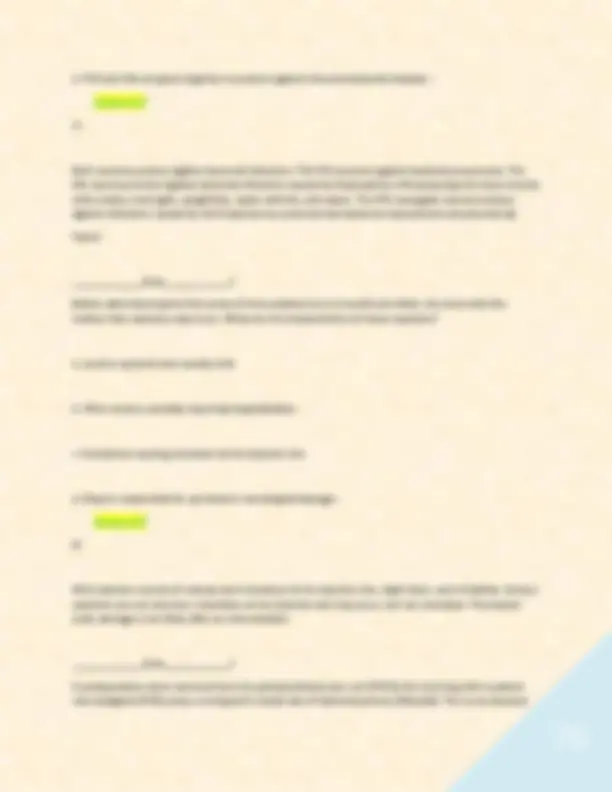
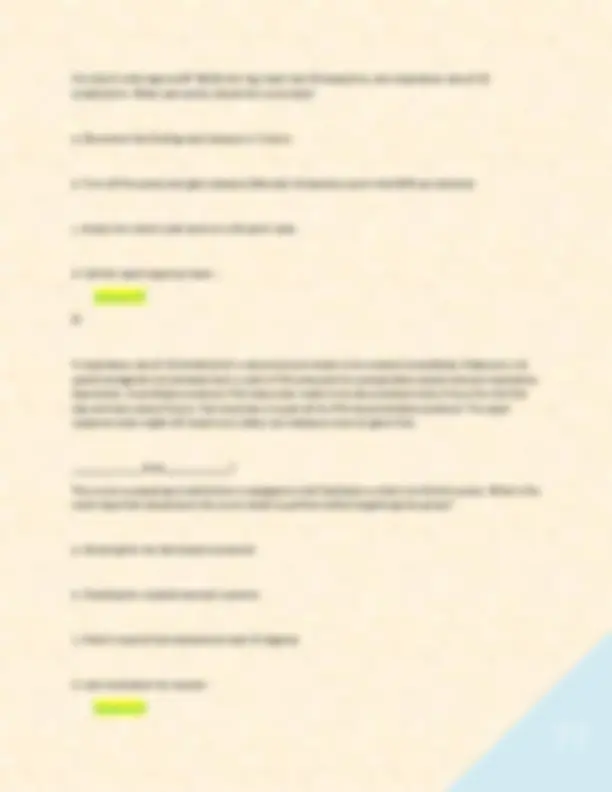
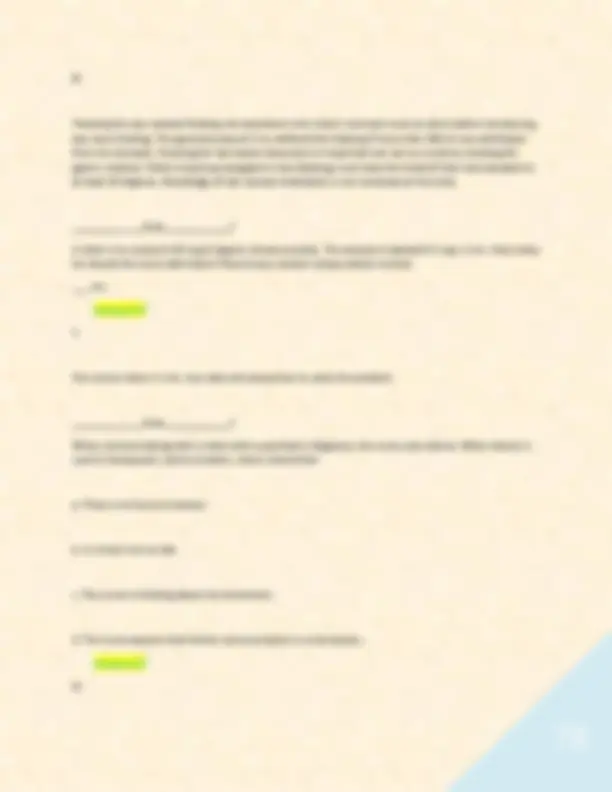
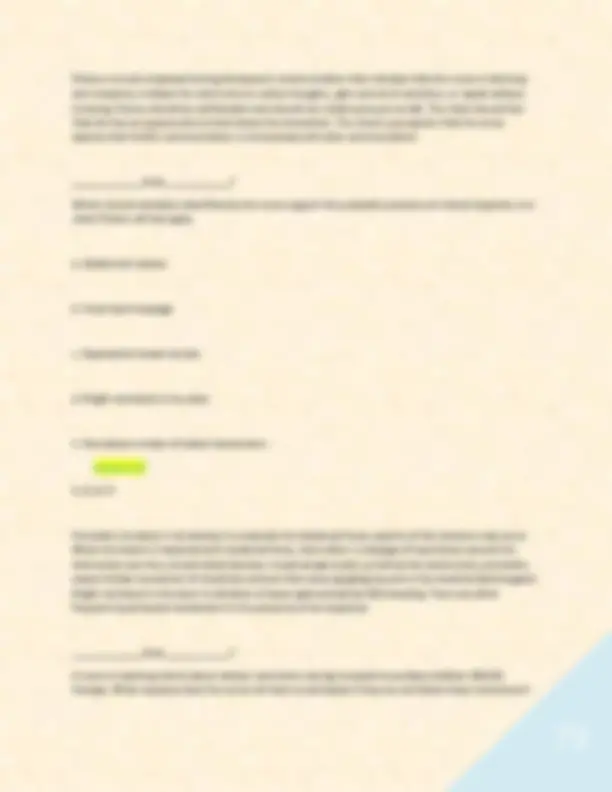
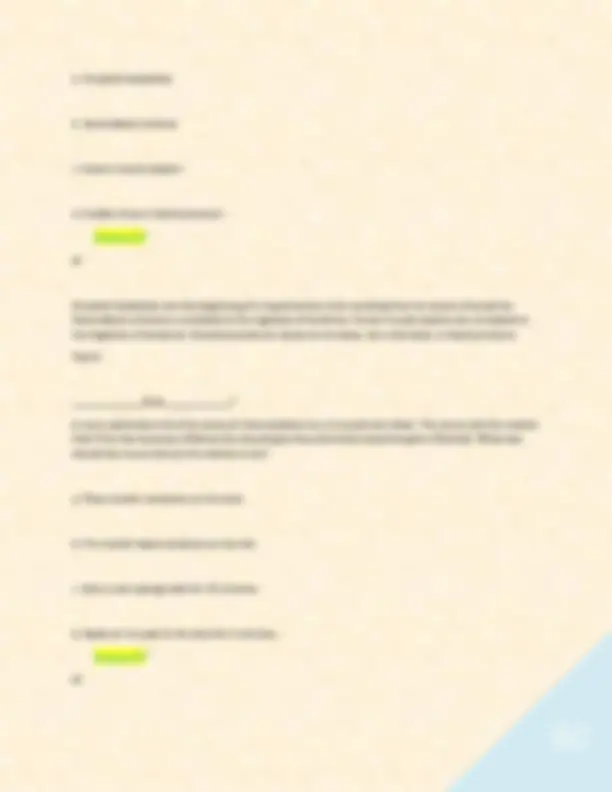
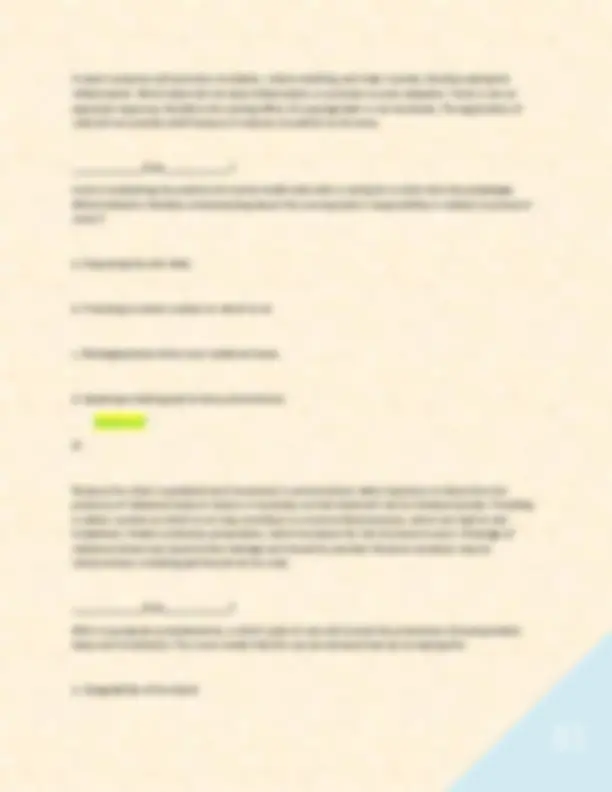
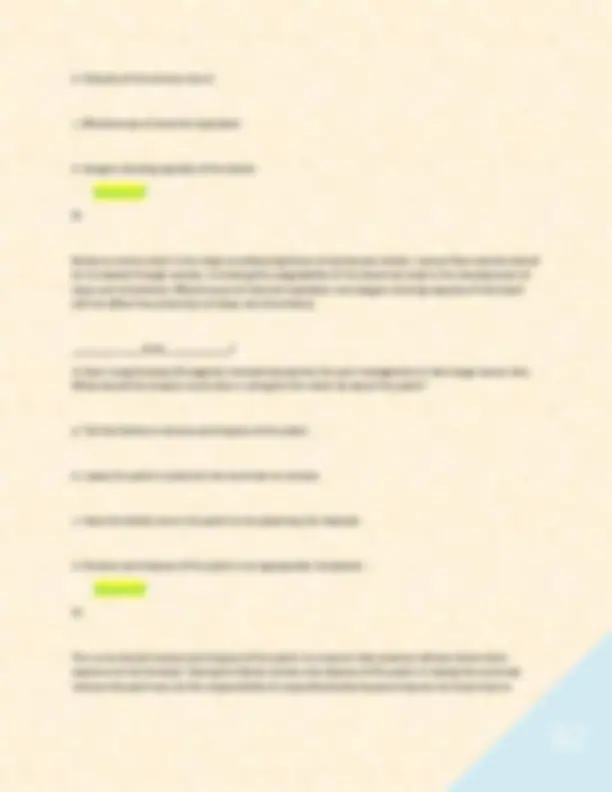
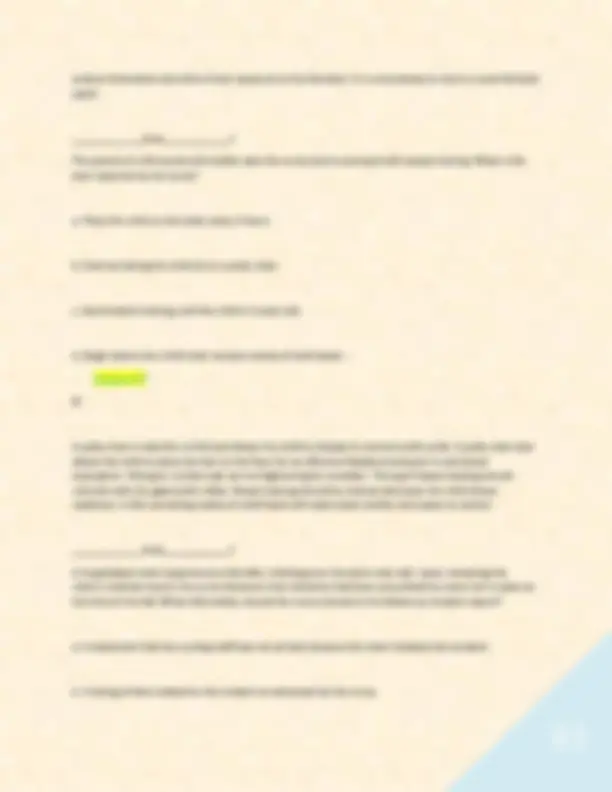
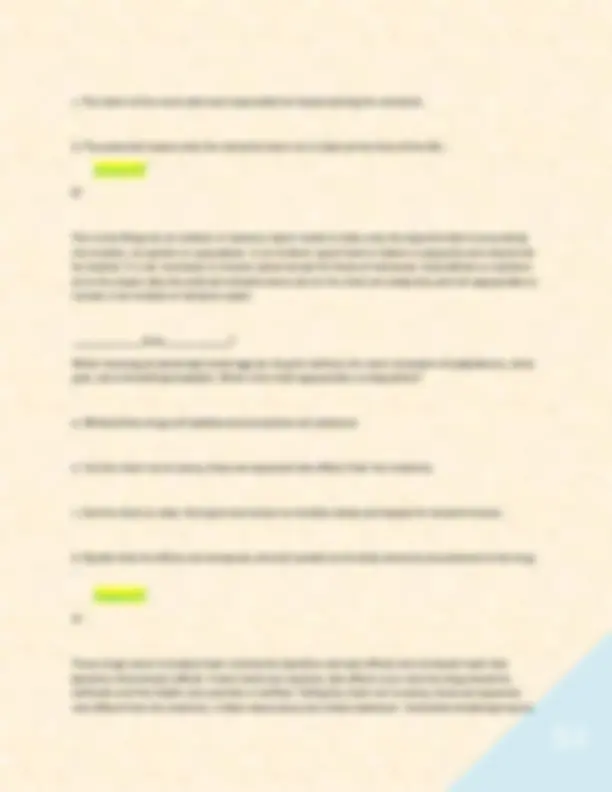
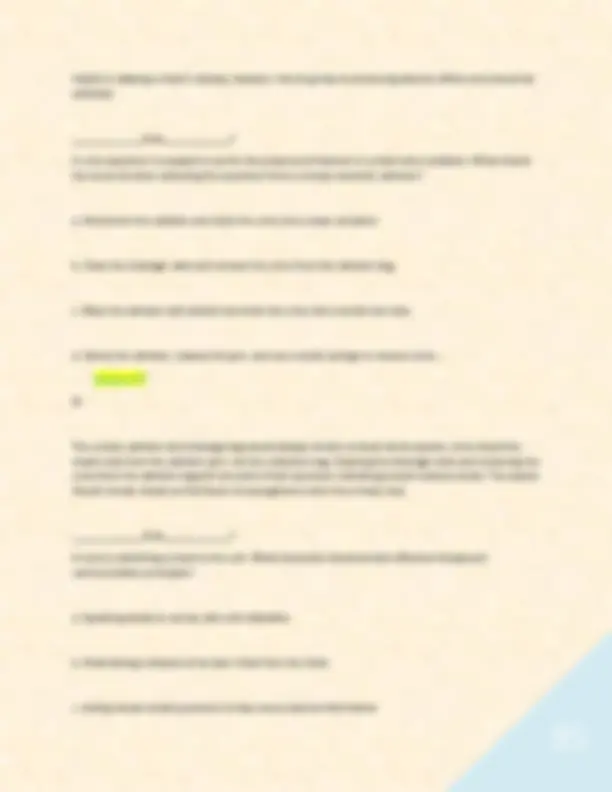
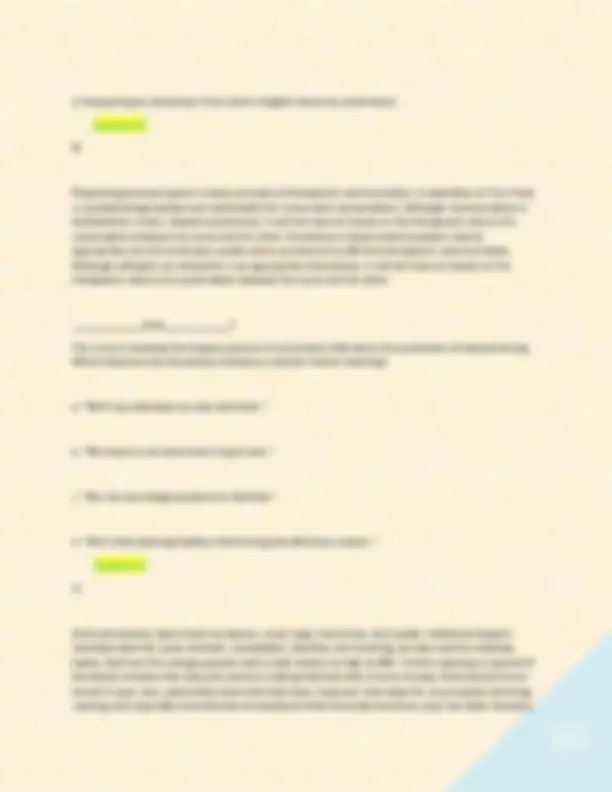
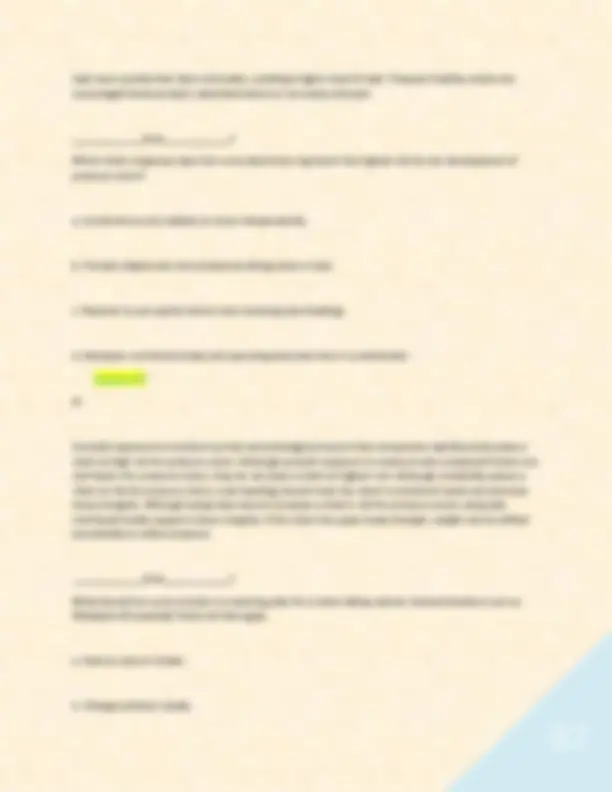
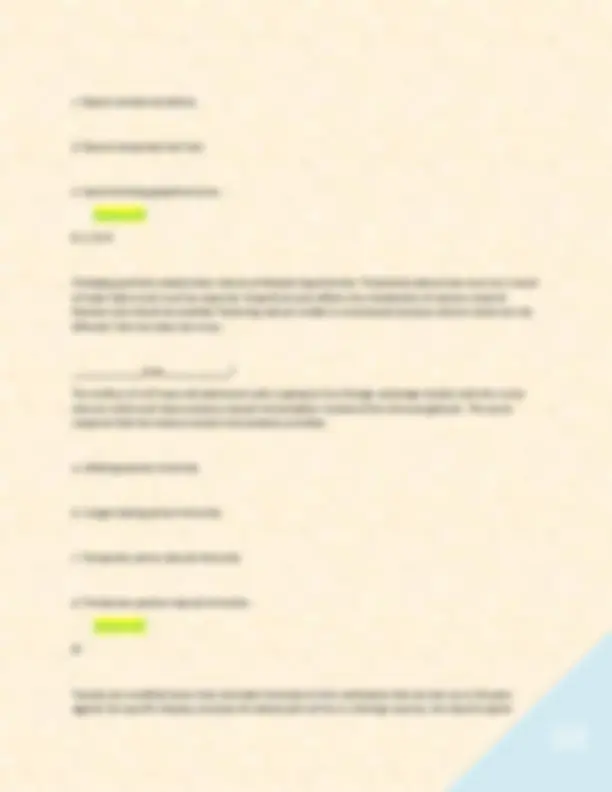
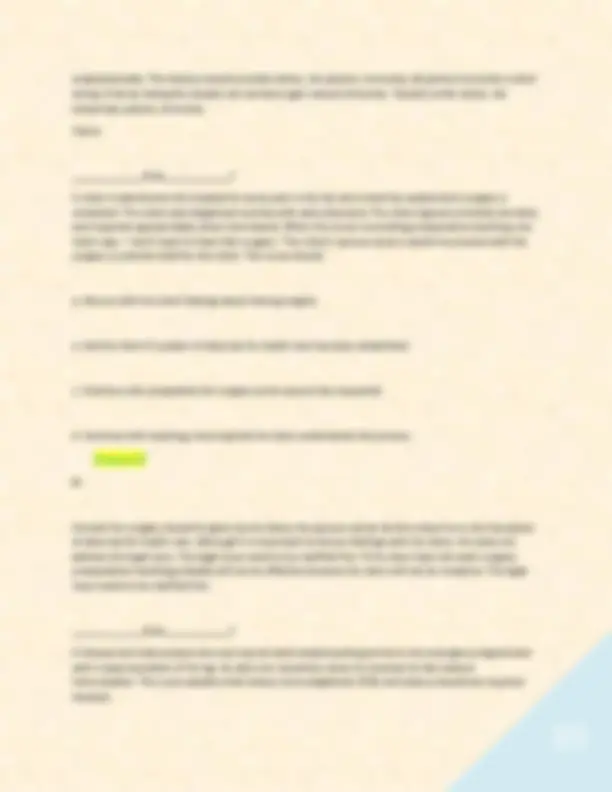
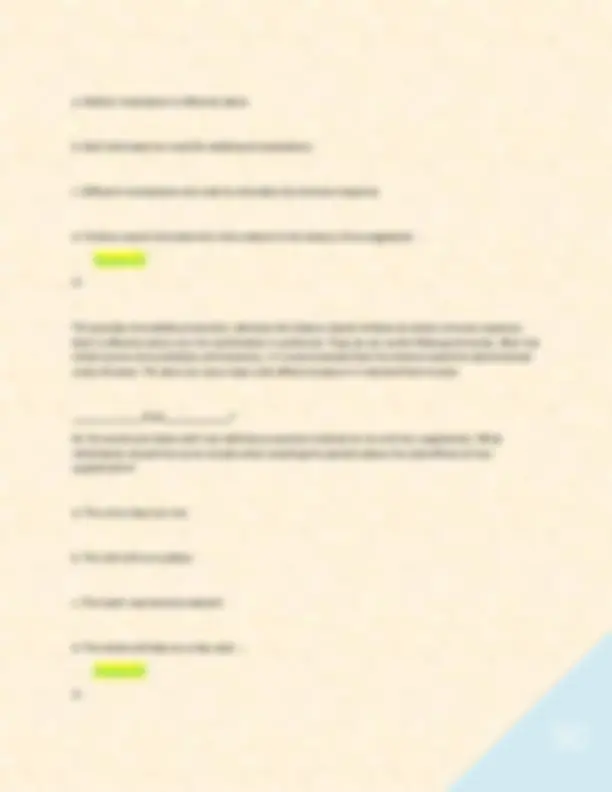
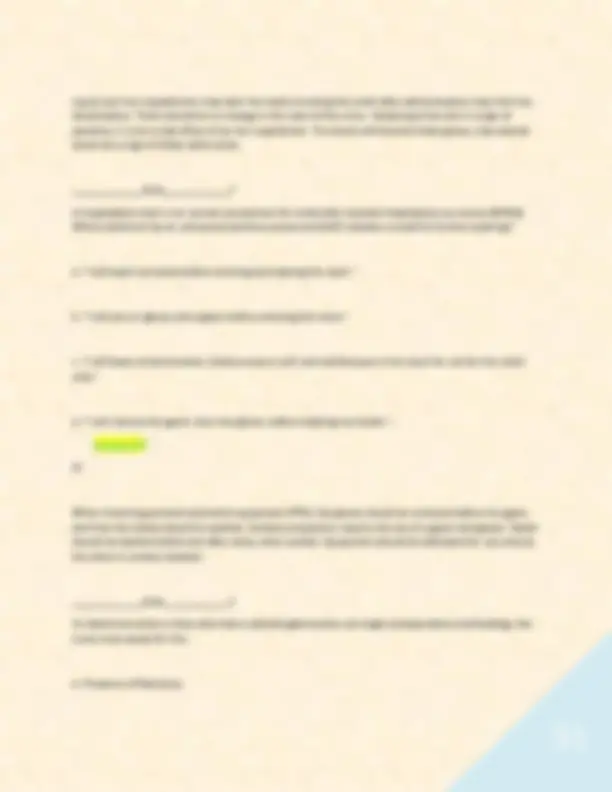
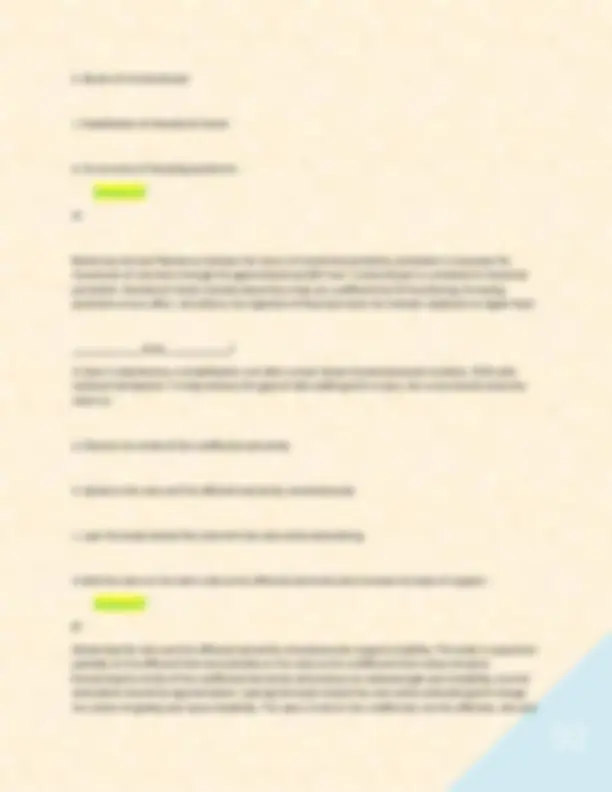
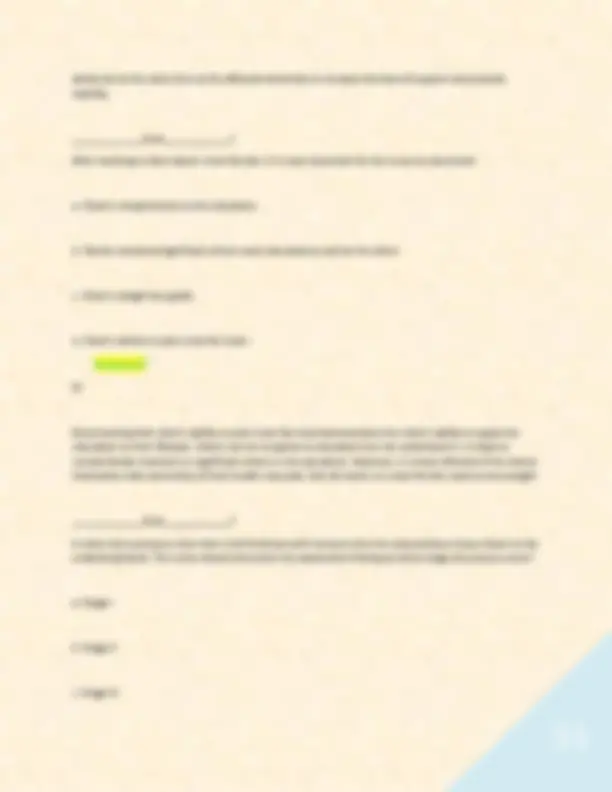
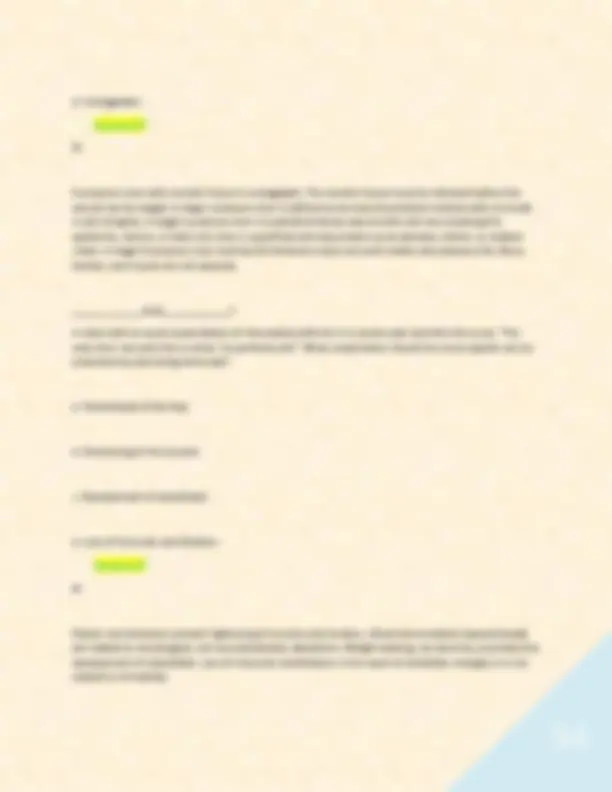
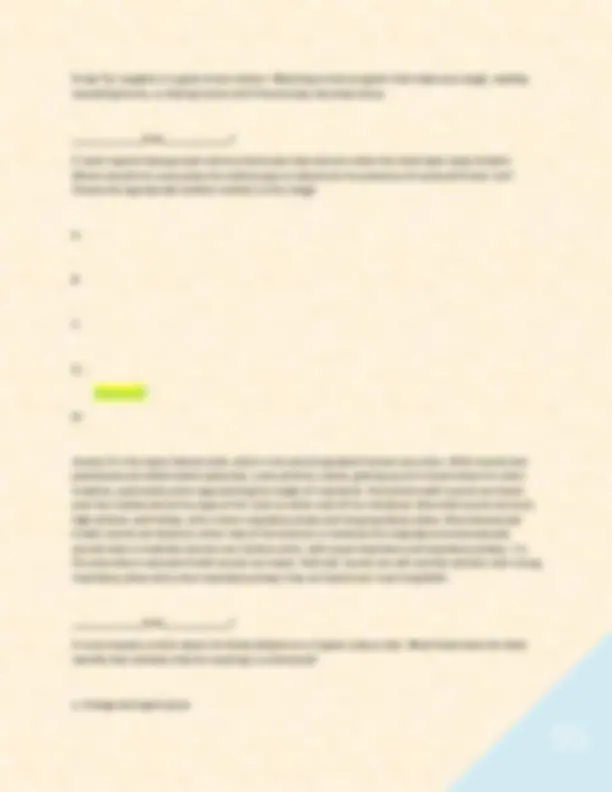
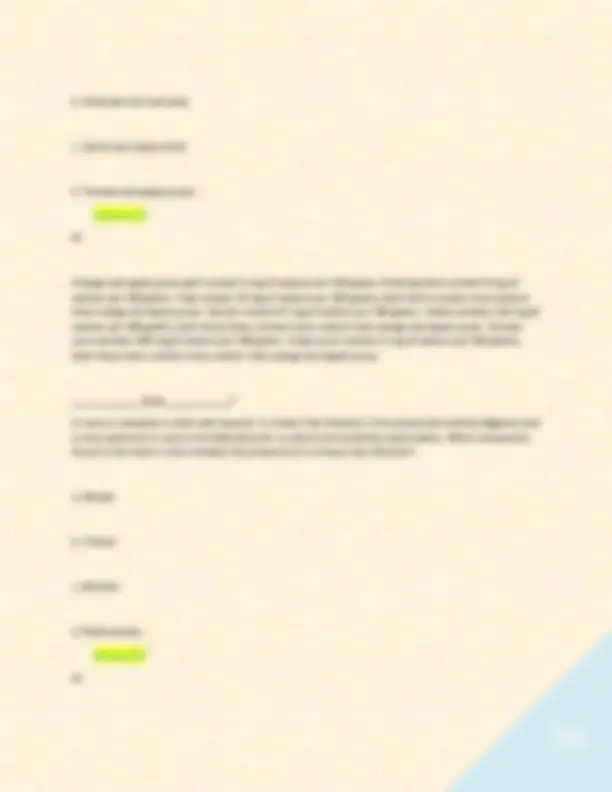
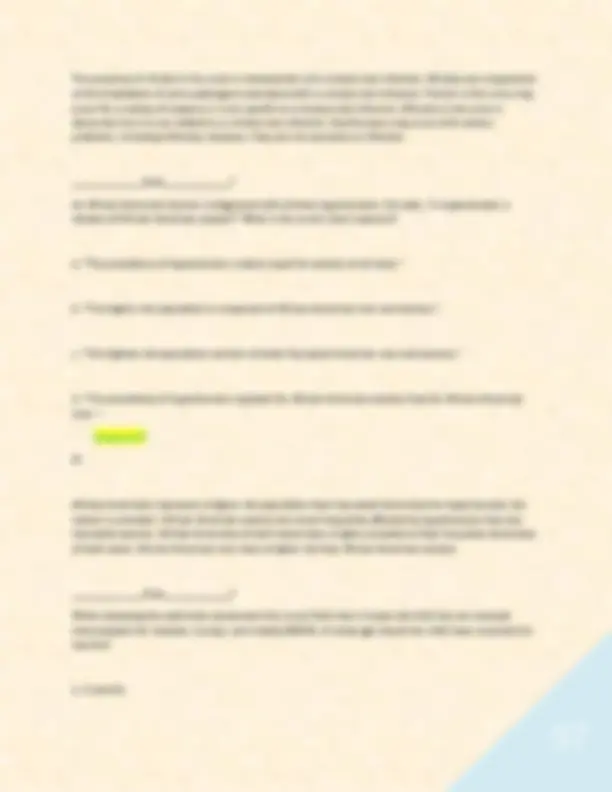
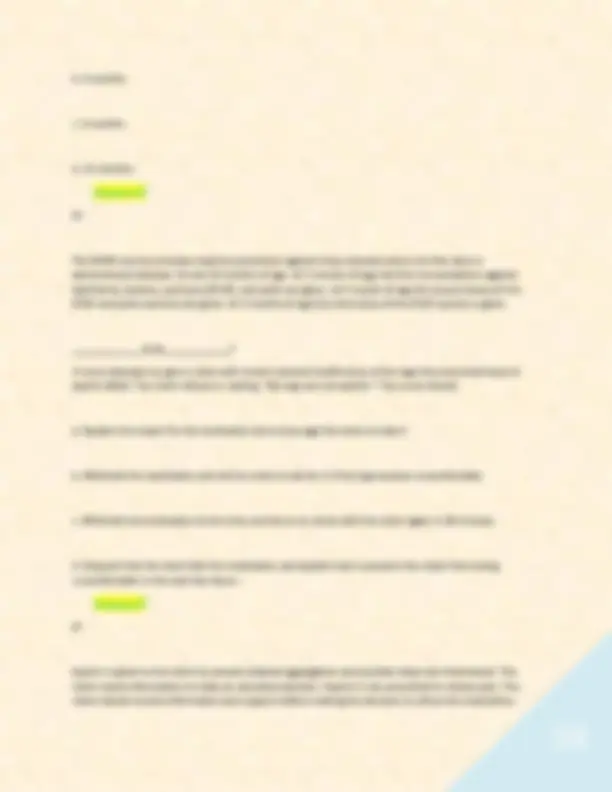
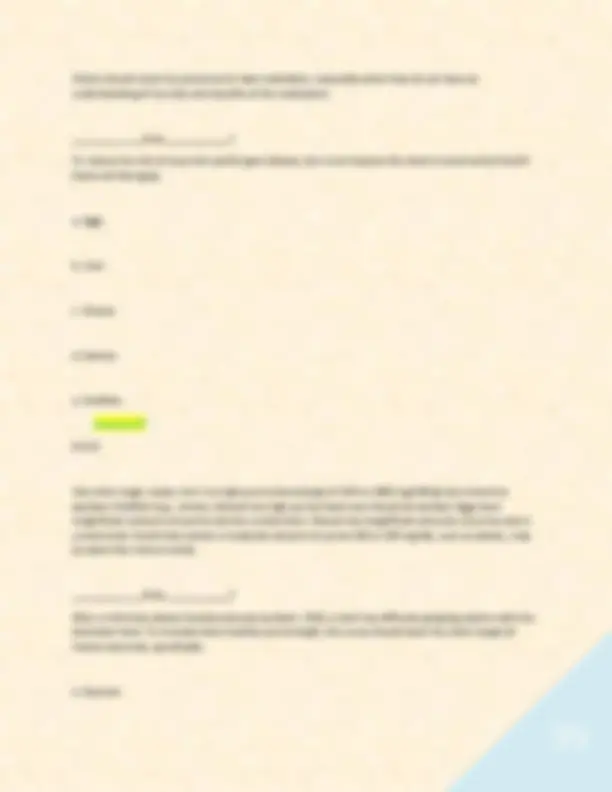
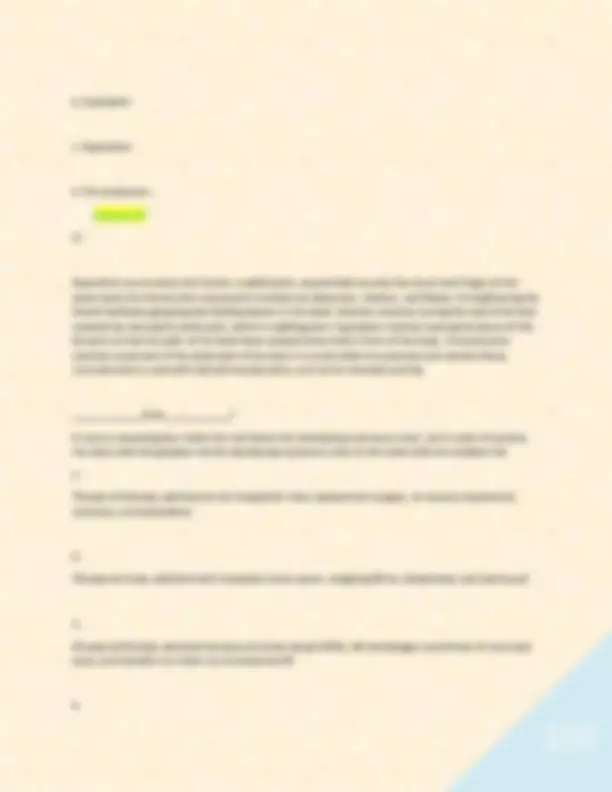


Study with the several resources on Docsity

Earn points by helping other students or get them with a premium plan


Prepare for your exams
Study with the several resources on Docsity

Earn points to download
Earn points by helping other students or get them with a premium plan
Community
Ask the community for help and clear up your study doubts
Discover the best universities in your country according to Docsity users
Free resources
Download our free guides on studying techniques, anxiety management strategies, and thesis advice from Docsity tutors
HESI for NUR 112 / NUR 112 (NEWEST 2025/2026) Expert Verified Actual Questions & Answers with Rationales for Guaranteed Pass | Newest Update, 2025-2026. _____________Quiz____________? A client arrives for a vaccination at an influenza prevention clinic. A nursing assessment identifies a current febrile illness with a cough. The nurse should: a. Give the vaccine b. Administer aspirin with the vaccine c. Hold the vaccine and notify the health care provider d. Reschedule administration of the vaccine for the next month - Answer✓✓ D! The appropriate response is to delay the administration of the vaccine until the client is healthy. Vaccines should not be administered during a febrile illness. Administering an aspirin is a dependent function of the nurse and requires a health care provider's prescription. Although holding the vaccine and administering it after the fever and cough are resolved is appropriate, notifying the health care provider is not necessary.
Typology: Exams
1 / 127

This page cannot be seen from the preview
Don't miss anything!





























































































_____________Quiz____________? A client arrives for a vaccination at an influenza prevention clinic. A nursing assessment identifies a current febrile illness with a cough. The nurse should: a. Give the vaccine b. Administer aspirin with the vaccine c. Hold the vaccine and notify the health care provider d. Reschedule administration of the vaccine for the next month -
The appropriate response is to delay the administration of the vaccine until the client is healthy. Vaccines should not be administered during a febrile illness. Administering an aspirin is a dependent function of the nurse and requires a health care provider's prescription. Although holding the vaccine and administering it after the fever and cough are resolved is appropriate, notifying the health care provider is not necessary.
_____________Quiz____________? A daughter of a Chinese speaking client approaches a nurse and asks multiple questions while maintaining direct eye contact. What culturally related concept does the daughter's behavior reflect? a. Prejudice b. Stereotyping c. Assimilation d. Ethnocentrism -
Assimilation involves incorporating the behaviors of the dominant culture. Maintaining eye contact is characteristic of the American culture and not Asian cultures. Prejudice is a negative belief about another person or group and does not characterize this behavior. Stereotyping is the perception that all members of a group are alike. Ethnocentrism is the perception that one's beliefs are better than those of others. _____________Quiz____________? A client has a hiatal hernia. The client is 5 feet 3 inches tall and weighs 160 pounds. When the nurse discusses prevention of esophageal reflux, what should be included? a. "Increase your intake of fat with each meal." b. "Lie down after eating to help your digestion." c. "Reduce your caloric intake to foster weight reduction." d. "Drink several glasses of fluid during each of your meals." -
Test-Taking Tip: You have at least a 25% chance of selecting the correct response in multiple-choice items. If you are uncertain about a question, eliminate the choices that you believe are wrong and then call on your knowledge, skills, and abilities to choose from the remaining responses. _____________Quiz____________? A nurse has just administered an immunization injection to a 2-month-old infant. What instructions should the nurse give the parent if the infant has a reaction? a. Give aspirin for pain; if swelling at the injection site develops, call the health care provider. b. Apply heat to the injection site for the first day after the injection; apply ice if the arm is inflamed. c. Give acetaminophen for fever; call the health care provider if the child exhibits marked drowsiness or seizures. d. Apply ice to the injection site if soreness develops; call the health care provider if the child comes down with a fever -
Fever is a common reaction to immunizations, and acetaminophen may be given to minimize discomfort. A central nervous system reaction is rare and requires notification of the health care provider. Aspirin should not be given to infants and children because it is linked to Reye syndrome. Infants do not tolerate the application of ice, which will increase discomfort. Fever is a common reaction to the immunizations; it is not necessary to notify the health care provider. _____________Quiz____________? A nurse inserts a nasogastric tube before an infant is to receive a tube feeding. What action should the nurse take when the infant begins to cough and gag? a. Auscultating for breath sounds
b. Removing the tube, then reinserting it c. Administering the tube feeding slowly d. Observing the infant for circumoral cyanosis -
The infant's response indicates that the tube may be in the trachea rather than the stomach. The tube should be removed, reinserted, and verified for its placement before the feeding is started. Auscultating for breath sounds does not provide information about the placement of the tube. The tube should be removed immediately; it is unsafe to assess the infant for additional signs of respiratory distress. It is unsafe to administer the feeding until placement in the stomach has been confirmed. _____________Quiz____________? A 26-year-old homosexual client is diagnosed with acquired immune deficiency syndrome (AIDS). The primary nurse reports to the nursing team that the client cried when told of the diagnosis. One of the nursing assistants responds, "I don't feel sorry for him. He made his bed, and now he can lie in it." To best help the nursing assistant, the nurse manager must first identify that this comment most likely is a result of the nursing assistant's: a. Values and beliefs about sexual lifestyles. b. Anger and mistrust of homosexual males in general. c. Discomfort with men who are unable to control their emotions. d. Hostility over having to care for someone with a sexually transmitted infection -
b. Cover electric outlets with safety plugs. c. Remove toxic substances from accessible areas. d. Test the temperature of water before bathing. -
Excessively high temperatures can damage the delicate skin of an infant. Although infants are capable of putting small things in their mouths, they are not yet able to crawl and probably will not be placed on the floor. At 3 months of age infants are not yet able to explore the environment to the point that electric outlets pose a problem. At 3 months of age infants are still too small and have not yet developed motor capabilities to get into containers of poison. _____________Quiz____________? A nurse has provided discharge instructions to a client that received a prescription for a walker to use for assistance with ambulation. The nurse determines that the teaching has been effective when the client: a. Picks up the walker and carries it for short distances b. Uses the walker only when someone else is present c. Moves the walker no more than 12 inches in front of the client during use d. States that a walker will be purchased on the way home from the hospital -
Safety is always a consideration when teaching a client how to use an assistive device. Therefore the correct procedure regarding using a walker is to move the walker no more than 12 inches in front to maintain balance and to be effective in forward movement. Carrying the walker when ambulating is incorrect. Once the client is instructed and can demonstrate correct use of a walker, there is no need for someone to be present every time the client uses the walker. If the client is ordered to use a walker as part of the discharge plan, it needs to be provided before leaving the hospital. _____________Quiz____________? A client with terminal cancer is to receive 2 mg of hydromorphone (Dilaudid) IV every 4 hours as needed for severe breakthrough pain. The vial contains10 mg/mL. When the client complains of severe pain, how much solution of hydromorphone should the nurse administer? Record your answer using one decimal place. Include a leading zero if applicable. ___ mL -
0.2 mL _____________Quiz____________? The nurse is teaching hygiene practices to a 16-year-old patient who has recently had her first menstrual flow. Under which phase of development does the nurse classify the patient? a. Prepubescence b. Postpubescence c. Late adolescence d. Middle adolescence -
Adolescence is a period of psychological, social, and maturational growth. There are subphases of adolescence. Middle adolescence occurs between the ages of 15 and 17. Prepubescence occurs 2 years
b. Discarding the aspirate and administering the full feeding c. Returning the aspirate and subtracting the amount of the aspirate from the feeding d. Discarding the aspirate and adding an equal amount of normal saline solution to the feeding -
The aspirate should be returned to ensure that the gastric enzymes and acid-base balance are maintained. The amount of the aspirate returned should be subtracted from the volume to be administered in the next feeding. Withholding the feeding will compromise the infant's fluid and electrolyte balance, as will discarding the aspirate from the full feeding. Discarding the aspirate and adding an equal amount of normal saline solution to the feeding will compromise the infant's fluid and electrolyte balance. _____________Quiz____________? Which medication should the nurse anticipate the health care provider will prescribe to relieve the pain experienced by a client with rheumatoid arthritis? a. Acetylsalicylic acid (Aspirin) b. Hydromorphone (Dilaudid) c. Meperidine (Demerol) d. Alprazolam (Xanax) -
Because of its antiinflammatory effect, acetylsalicylic acid is useful in treating arthritis symptoms. Opioids should be avoided because they promote drug dependency and do not affect the inflammatory process. Alprazolam is an antianxiety, not an antiinflammatory, agent. _____________Quiz____________? A client with rheumatoid arthritis takes aspirin (ASA) routinely to reduce pain. The client asks whether it is the arthritis, the aspirin, or some other ear problem that causes the bilateral ear buzzing the client is now experiencing. What is an appropriate nursing response? a. "The ringing in your ears is a sign of otitis media." b. "Aspirin may have damaged your eighth cranial nerve, the acoustic nerve." c. "Accumulation of cerumen, or ear wax, causes ringing in the ears." d. "Your symptoms are an expected response to the aging process." -
ASA may damage the eighth cranial (acoustic) nerve, causing ringing in the ears and impaired hearing. Pain, not ringing in the ears, is a sign of otitis media; ASA toxicity affects the eighth cranial nerve, not the middle ear. Diminished hearing, not ringing, occurs because of mechanical obstruction of the outer ear. Aging may cause decreasing acuity in the extremes of pitch, but it does not cause ringing in the ears. _____________Quiz____________? If a 5½-month-old infant's immunizations are on schedule, which immunizations does the nurse expect the infant to have had already? a. Measles, mumps, and rubella vaccine b. Booster dose of inactivated polio vaccine
that the nurse respects the client and the choices that are made. Paternalism occurs if the nurse interferes with the individual's autonomy by disregarding the client's choices. _____________Quiz____________? A nurse on the adolescent unit is planning to discuss smoking prevention. What is the most effective approach for the nurse to use? a. Sharing personal experiences with a smoking-cessation program b. Showing pictures of the effects of smoking on the cardiopulmonary system c. Presenting information on how smoking affects appearance and odor of the breath d. Citing statistics about the relationship between smoking and cardiopulmonary diseases -
Establishing an identity is the major developmental task of the adolescent; to achieve this task, the adolescent needs to conform to group norms that include appearance and acceptance. Appealing to this need may achieve more success than other teaching strategies. Sharing personal experiences with a smoking-cessation program is a teaching strategy that may be successful with an older, more secure group of people. Adolescents tend to believe that they are invincible and probably will not relate to this teaching strategy. They are also concerned about the present, not the future. Because adolescents believe they are invincible, they would not relate to a teaching strategy based on statistics about the harmful effects of smoking. Study Tip: Record the information you find to be most difficult to remember on 3" × 5" cards and carry them with you in your pocket or purse. When you are waiting in traffic or for an appointment, just pull out the cards and review again. This "found" time may add points to your test scores that you have lost in the past. _____________Quiz____________?
A client reports experiencing nausea, dyspnea, and right upper quadrant pain unrelieved by antacids. The pain occurs most often after eating in fast-food restaurants. Which diet should the nurse instruct the client to follow? a. Low fat b. Low carbohydrate c. Soft textured and bland d. High protein and kilocalories -
The presence of fat in the duodenum stimulates painful contractions of the gallbladder to release bile; fat intake should be restricted. Carbohydrates do not have to be restricted. A reduction in spices and bulk is not necessary. Although a high protein and kilocalories diet might be desirable as long as the protein is not high in saturated fat, a high-calorie diet generally is not prescribed. Test-Taking Tip: Note the number of questions and the total time allotted for the test to calculate the times at which you should be halfway and three-quarters finished with the test. Look at the clock only every 10 minutes or so. _____________Quiz____________? A nurse who is teaching a growth and development class to a group of parents at the daycare center explains that the toddler strives for a sense of: a. Trust b. Industry
_____________Quiz____________? A nurse is caring for a client after a total knee replacement who is requesting Vicodin in addition to the patient-controlled analgesia (PCA). The client reports having taken two Vicodin tablets every 4 hours for several weeks before surgery. If each tablet contains 500 mg of acetaminophen, how much acetaminophen had the client been ingesting per day? Record your answer using a whole number. ___ mg -
6000 mg Two tablets every 4 hours over 24 hours equals a total of 12 tablets daily. Because each tablet has 500 mg, then 500 × 12 = 6000 mg. This is more than the recommended maximum dose of 4000 mg/24 hr for short-term use. _____________Quiz____________? A nurse teaches a client with varicose veins about prevention of a thromboembolus. Which statement regarding preventive measures indicates that the client requires further teaching? a. "I must increase my fluid intake." b."I will massage my legs twice a day." c. "Elastic stockings should be put on before getting out of bed." d. "Involving my upper and lower extremeties in all exercises is important. -
Massaging the legs twice a day is unsafe if a thrombus is present because it may dislodge and cause an embolus. Fluids decrease blood viscosity, reducing the risk for thrombus formation. Elastic stockings physically compress veins, preventing venous stasis and lowering the risk for thrombus formation.
Range-of-motion exercises prevent venous stasis and promote muscle tone; they propel venous blood toward the heart, facilitated by venous one-way valves. _____________Quiz____________? A 4-month-old infant is to receive the second diphtheria/tetanus/pertussis (DTaP) immunization. The nurse reviews the infant's medical history before administering the vaccine. What information in the infant's history will influence the decision whether to administer the vaccine? a. Allergy to eggs b. Lactose intolerance c. Infectious dermatitis d. High fever after the first dose -
A temperature of 105° F (40.5° C) or higher after a DTaP immunization is a contraindication to further DTaP immunizations. An allergy to eggs is not a contraindication to the administration of the DTaP vaccine because eggs are not used in the production of the vaccine. Lactose intolerance is not a contraindication to the administration of DTaP vaccine; nor is infectious dermatitis. _____________Quiz____________? A nurse hired to work in a metropolitan hospital provides services for a culturally diverse population. One of the nurses on the unit says it is the nurses' responsibility to discourage "these people" from bringing all that "home medicine stuff" to their family members. Which response by the recently hired nurse is most appropriate? a. "Hospital policies should put a stop to this." b. "Everyone should conform to the prevailing culture."
be a priority assessment after respiratory rate. Measurements of temperature and urinary output are part of the overall client assessment but not a priority with morphine. _____________Quiz____________? A toddler receives a gastrostomy tube feeding every 4 hours. What is the priority nursing intervention for this child? a. Opening the tube 1 hour before feeding b. Keeping the child lying flat during the feeding c. Flushing the tube with normal saline after the feeding d. Positioning the child on the right side after the feeding -
Positioning the child on the right side after feeding facilitates digestion because the pyloric sphincter is on this side and gravity aids emptying of the stomach. The feeding may be started immediately after the tube is opened. Keeping the child lying flat during the feeding may result in aspiration; the child's head and torso should be elevated. If the gastrostomy tube is flushed before or after a feeding, water, not normal saline, is used. _____________Quiz____________? A female client in the terminal stage of cancer is admitted to the hospital in severe pain. The client refuses the prescribed intramuscular analgesic for pain because it puts her to sleep and she wants to be awake. One day, despite the client's objection, a nurse administers the pain medication saying, "You know that this will make you more comfortable." The nurse in this situation could be charged with: a. Assault b. Battery c. Invasion of privacy
d. Lack of informed consent -
Battery is the intentional touching of one person by another without permission of the person being touched. Assault is an intentional act without touching that makes a person fearful or produces reasonable apprehension of bodily harm. Invasion of privacy refers to the right of clients to have their private affairs protected. Informed consent applies to permission for procedures and treatments to be performed. _____________Quiz____________? An infant has been vomiting after each feeding. Physical assessment reveals poor skin turgor, a sunken anterior fontanel, and tremors. The infant's acid-base balance is outside the expected range. What does the nurse suspect as the cause of this imbalance? a. Retention of potassium in the cells b. Loss of fluid by way of the kidneys c. Loss of chloride ions through vomiting d. Reduction of blood supply to body cells -
Electrolyte deficits, rather than urinary excretion, precipitate an acid-base imbalance. Loss of gastric secretions, which contain sodium, chloride, and potassium, usually results in metabolic alkalosis. With vomiting, a depletion of cellular potassium occurs. Electrolyte deficits, rather than inadequate blood supply, can precipitate an acid-base imbalance. _____________Quiz____________?